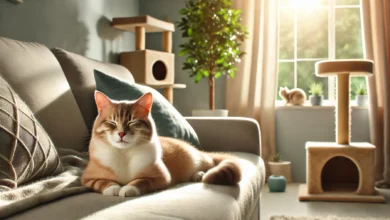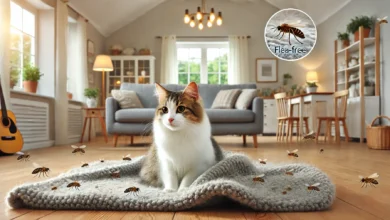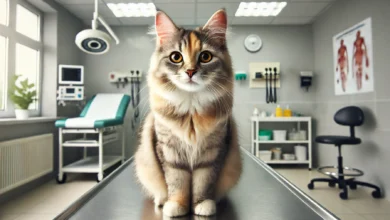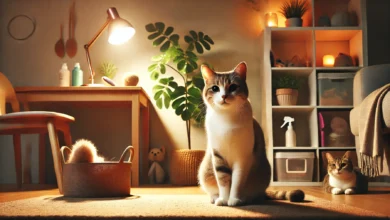Identifying Cat Gastroenteritis Causes and Treatments
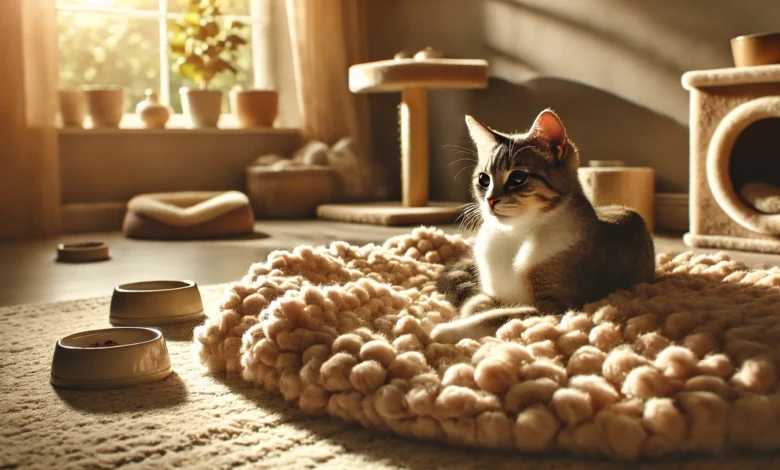
Feline gastroenteritis is one complaint that really gets any cat owner genuinely concerned.
Indeed, if your poor kitty suddenly vomits or has diarrhea, or both, you have ample reason to feel so concerned.
This article will outline ways of understanding the causes, symptoms, diagnosis, treatment, and prevention of cat gastroenteritis.
Whether it is a one-time bout of illness or chronic digestive issues, the ability to identify and manage gastroenteritis can make quite a difference in your cat’s health.
First, let’s take a closer look at what cat gastroenteritis is and why it happens.
Table of Contents
Understanding Cat Gastroenteritis: Causes and Symptoms
Gastroenteritis is a stomach and intestine inflammatory disease.
It affects cats regardless of their age and breed and usually develops together with digestive problems.
By being aware of its causes and symptoms, it’s possible to prevent a critical condition in due time.
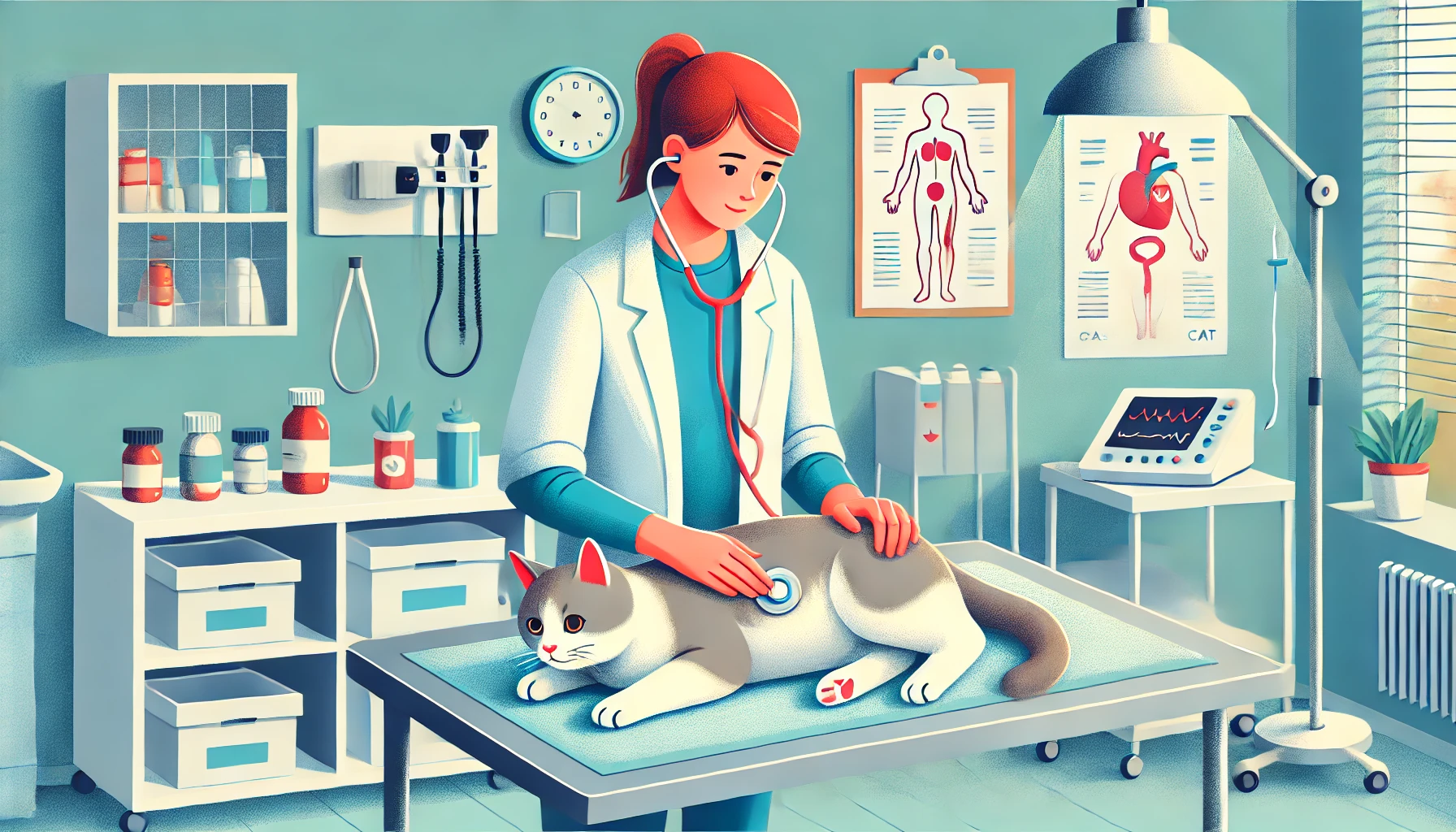
What is Cat Gastroenteritis?
Cat gastroenteritis is an infection of the gastrointestinal tract, whereby the irritation or inflammation affects either the intestines, stomach, or both.
This irritation will cause your pet to experience uncomfortable symptoms such as vomiting, diarrhea, and even abdominal pain.
The condition may be due to infections, changes in diet, or other health problems.
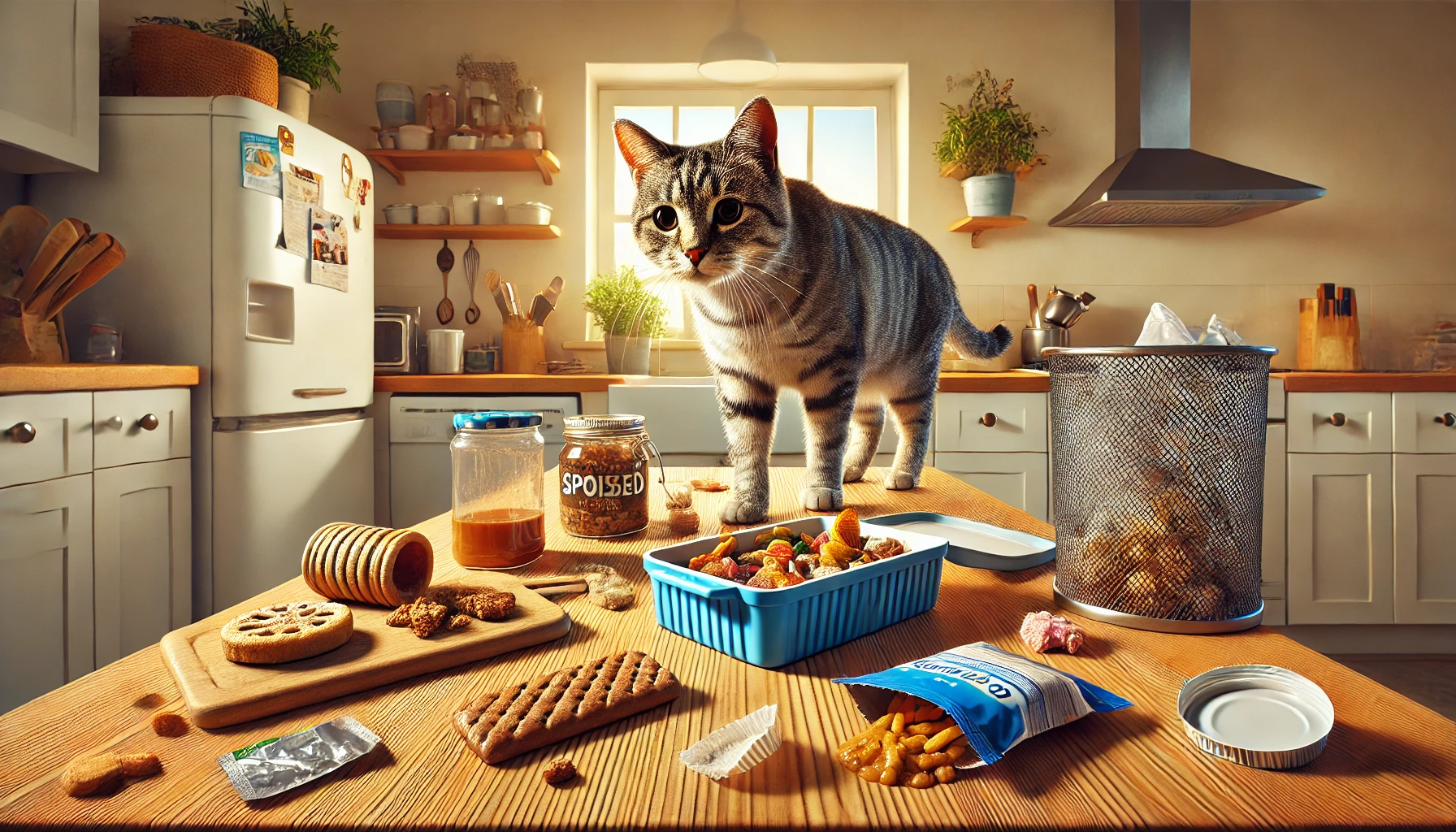
Common Causes of Gastroenteritis in Cats
Many factors may cause gastroenteritis in cats.
The most common causes include:
- Dietary Indiscretion: Cats that have a history of ingesting spoiled foods, garbage, or non-food items are highly prone to gastroenteritis.
- Infections: Viral, bacterial, and parasitic infections are common causes of cat gastroenteritis. Examples include feline panleukopenia, salmonella, and giardia.
- Food Allergies: Some cats can be sensitive to different ingredients in their food, such as grains or proteins, which can lead to gastrointestinal issues.
- Stress: Emotional or physical stress can disrupt your cat’s gastrointestinal system, leading to gastroenteritis.
- Medications: Certain medications can irritate the stomach lining, causing inflammation and the symptoms of gastroenteritis.
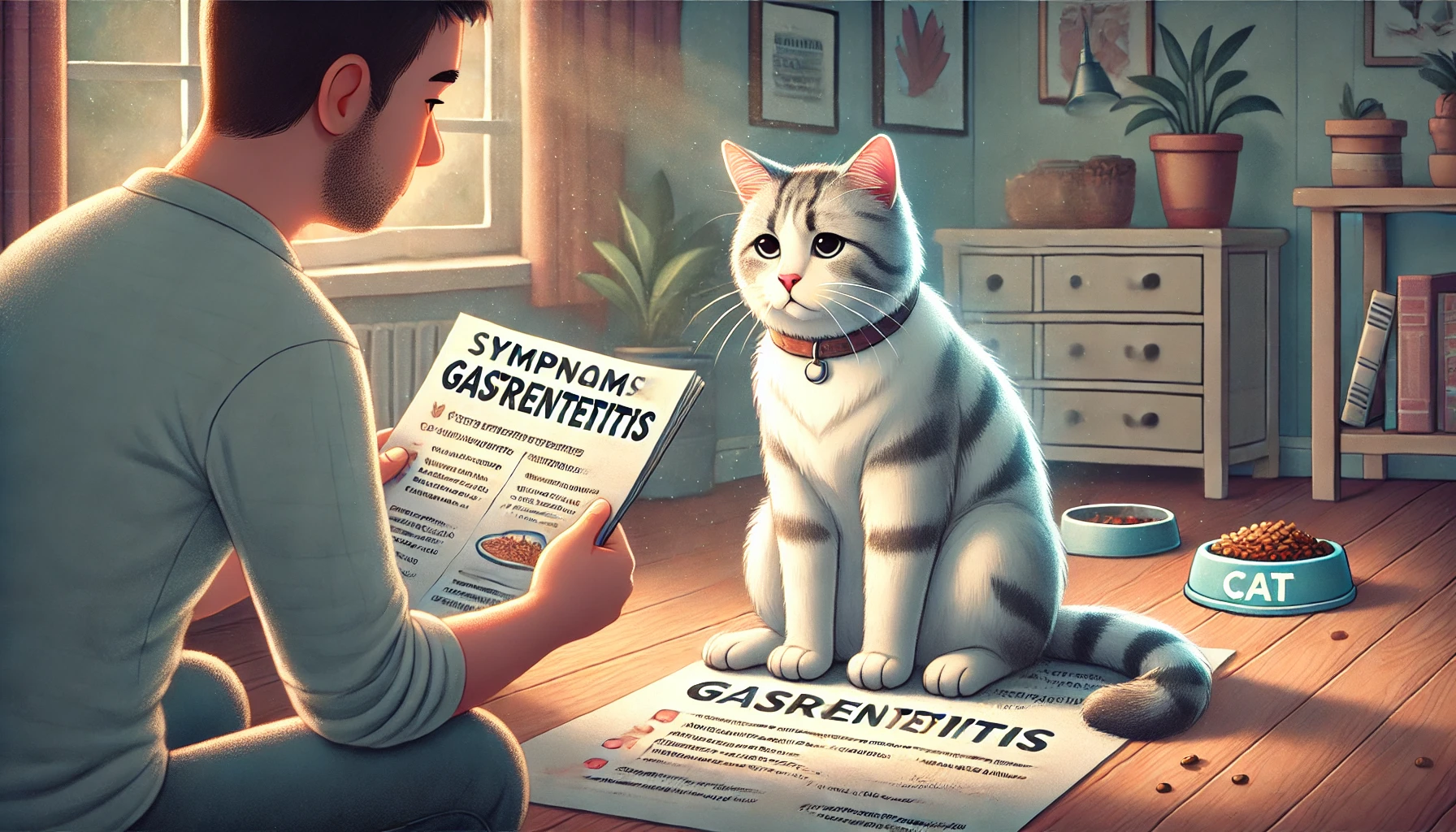
Identifying the Symptoms of Gastroenteritis in Cats
Early diagnosis, through the recognition of signs and symptoms of cat gastroenteritis, will prompt you to seek early treatment.
Common signs and symptoms include:
- Frequent vomiting or retching
- Diarrhea, often watery or with mucus
- Abdominal pain or bloating
- Lethargy or a noticeable lack of energy
- Dehydration due to fluid loss from vomiting or diarrhea
It should be noted that both vomiting and diarrhea can be brought on by many different conditions.
So, how can you differentiate whether your cat is experiencing gastroenteritis or not?
The key is the combination of symptoms and their persistence.
Repeated bouts of vomiting or diarrhea, especially with lethargy and dehydration, are more indicative of cat gastroenteritis.
If any of the symptoms persist or worsen, always consult your vet for further assistance.
Recognizing the causes and symptoms of cat gastroenteritis is key to early intervention. Symptoms like vomiting, diarrhea, and lethargy should be closely monitored for timely treatment.
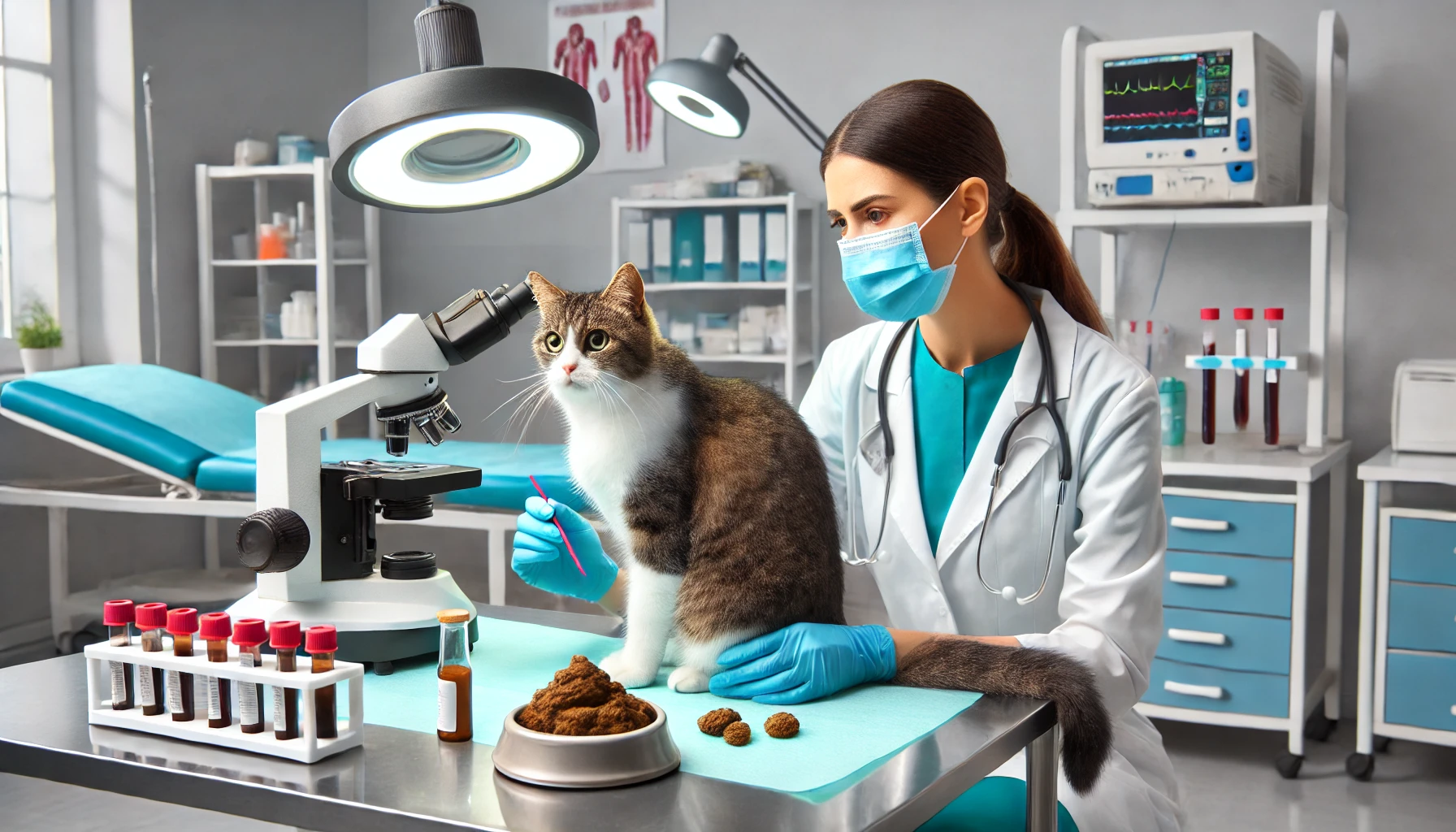
Diagnosing Cat Gastroenteritis: Tests and Procedures
If you suspect your cat is suffering from gastroenteritis, advice from a licensed veterinarian should be sought as soon as possible.
Proper diagnosis ensures the right treatment plan and helps rule out other serious conditions.
The diagnosis of cat gastroenteritis will typically involve several tests and procedures to identify the underlying causes of inflammation in your cat’s stomach and intestines.
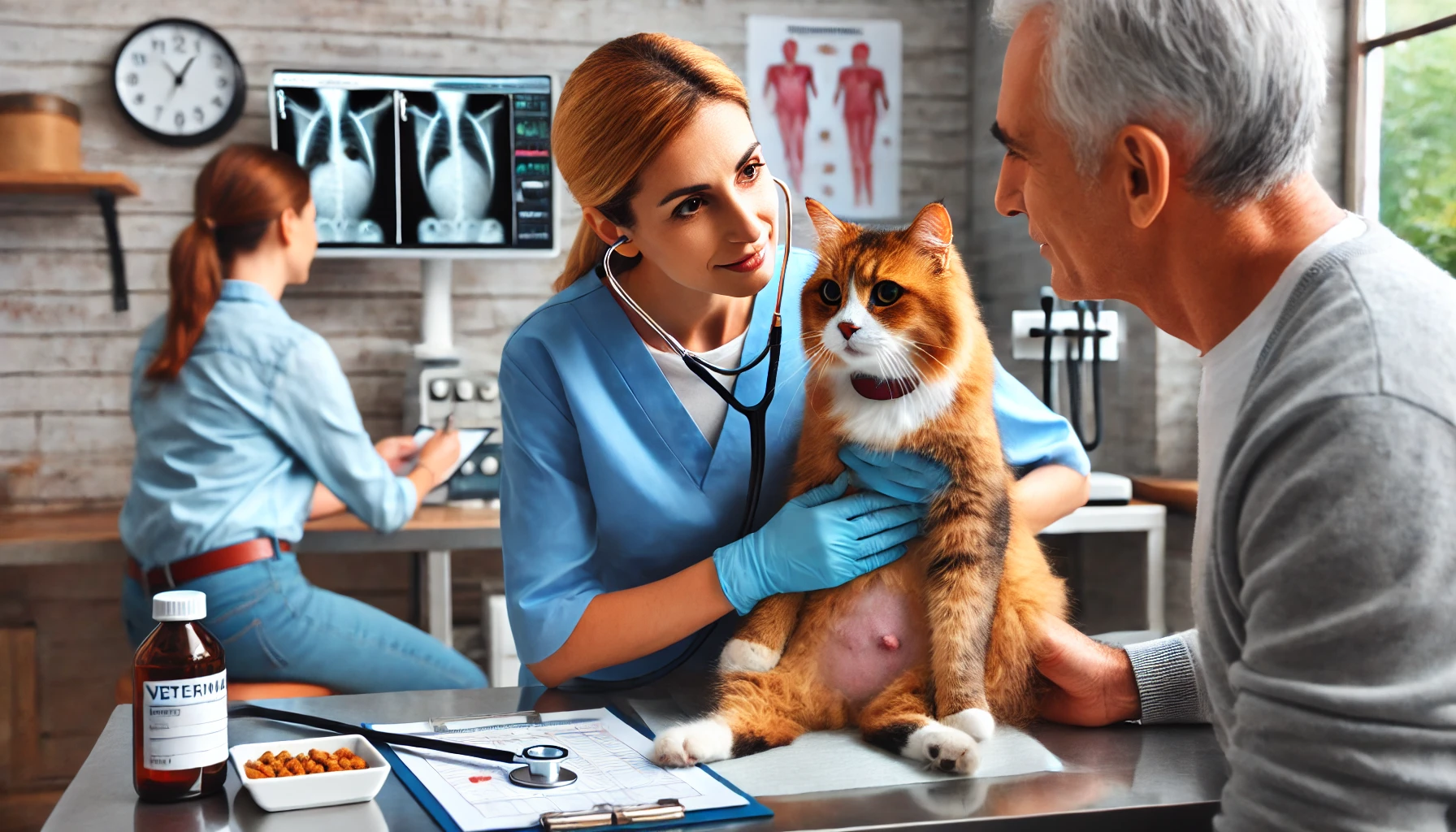
How Vets Diagnose Gastroenteritis in Cats
The diagnosis of cat gastroenteritis begins with a thorough examination by a veterinarian.
During this process, the vet will ask about your cat’s medical history, recent diet, exposure to toxins, and any behavioral changes you’ve noticed.
A physical examination is conducted to check for signs of dehydration, abdominal pain, or fever, all of which are associated with gastroenteritis.
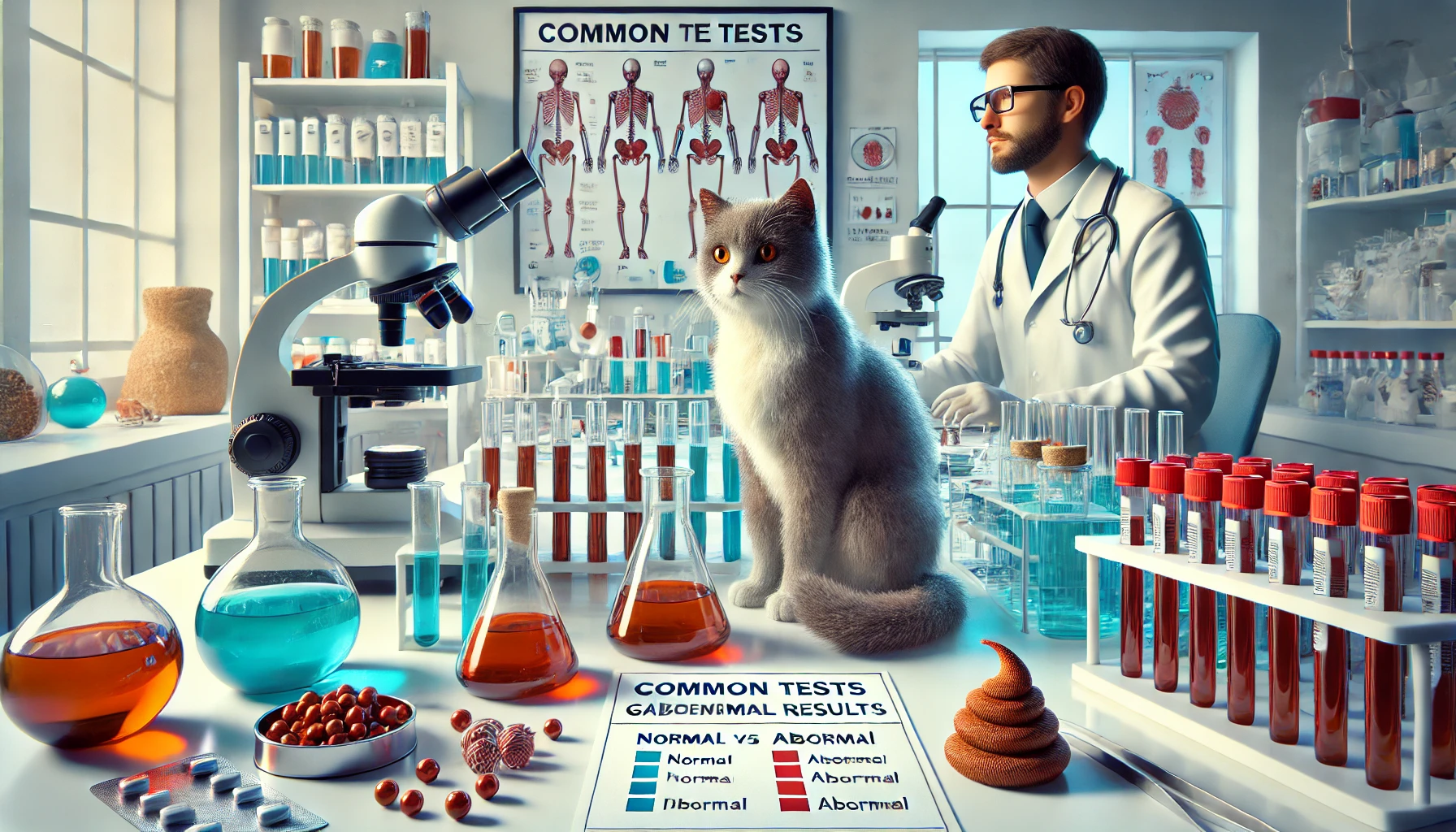
Common Tests Used to Identify Gastroenteritis
Veterinarians rely on a number of diagnostic tests to confirm gastroenteritis and identify its underlying cause.
These include:
- Blood tests: A complete blood count (CBC) and blood chemistry panel help assess your cat’s overall health and can detect infection, inflammation, or dehydration.
- Fecal examination: Stool samples are tested for parasites, bacterial infections, or other abnormalities that may be causing cat gastroenteritis.
- X-rays or ultrasounds: These imaging techniques allow the veterinarian to visualize any obstruction, foreign body, or mass in the feline gastrointestinal tract that may be causing the symptoms.
- Urinalysis: Testing your cat’s urine can rule out kidney problems or dehydration, which may be exacerbating the symptoms of gastroenteritis.
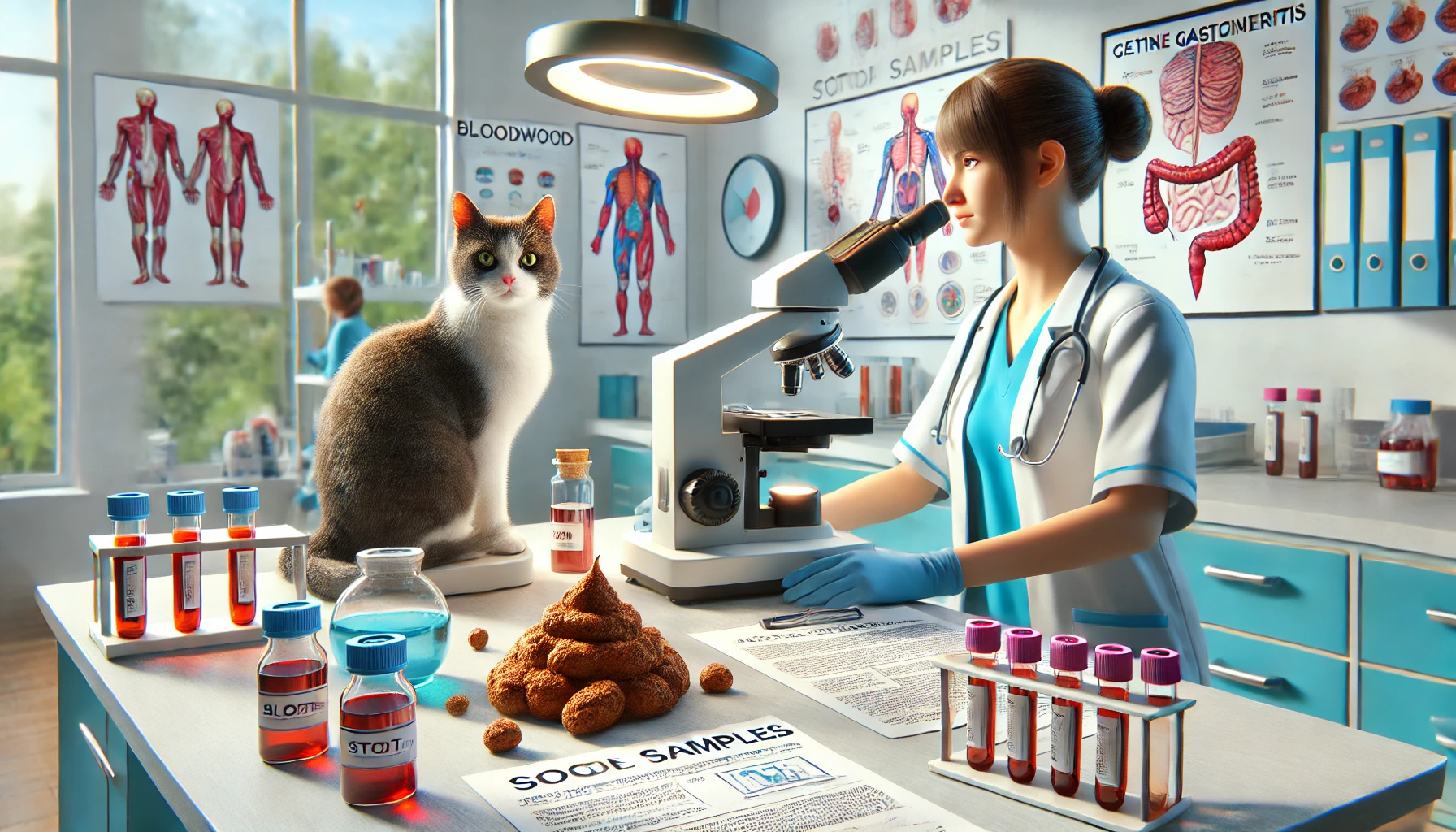
The Role of Bloodwork and Stool Samples in Diagnosis
Bloodwork is crucial in determining the severity of your cat’s condition.
It helps detect infections, inflammatory diseases, electrolyte imbalances, or dehydration.
Stool samples are equally important, as they allow the vet to identify parasitic infections such as giardia and bacterial infections like salmonella, both of which can cause cat gastroenteritis.
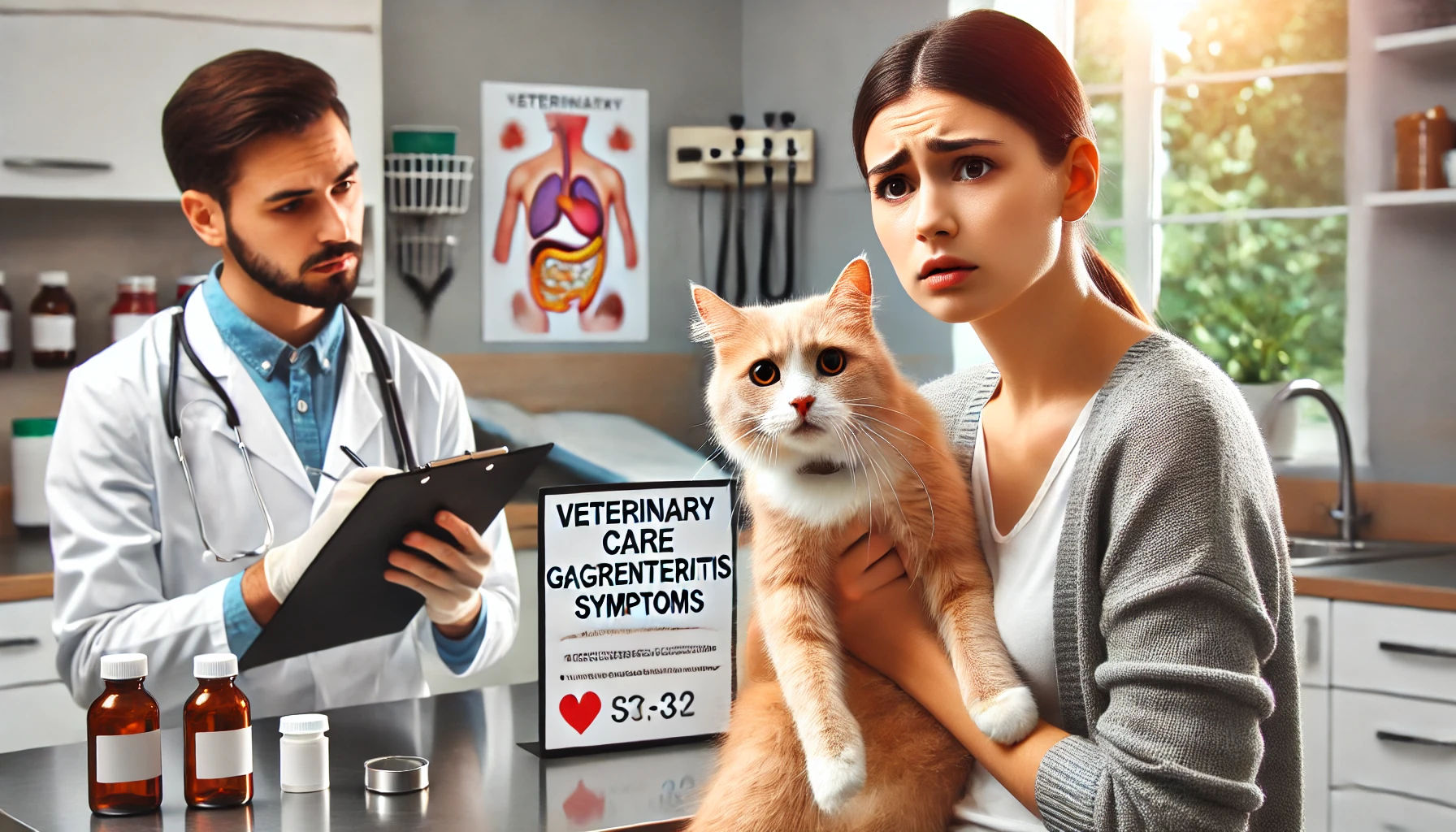
When to Visit the Vet for Gastroenteritis Symptoms
If your cat shows signs of gastroenteritis, such as persistent vomiting and diarrhea lasting more than 24 hours, a visit to the vet is necessary to prevent further complications.
Prolonged gastroenteritis can lead to severe dehydration and life-threatening issues.
Additionally, if your cat is lethargic, refuses to eat or drink, or shows blood in the stool, immediate veterinary attention is required to prevent further health deterioration.
Diagnosis through blood tests, fecal exams, and imaging helps identify the cause of gastroenteritis. Early vet consultation is vital for accurate treatment.
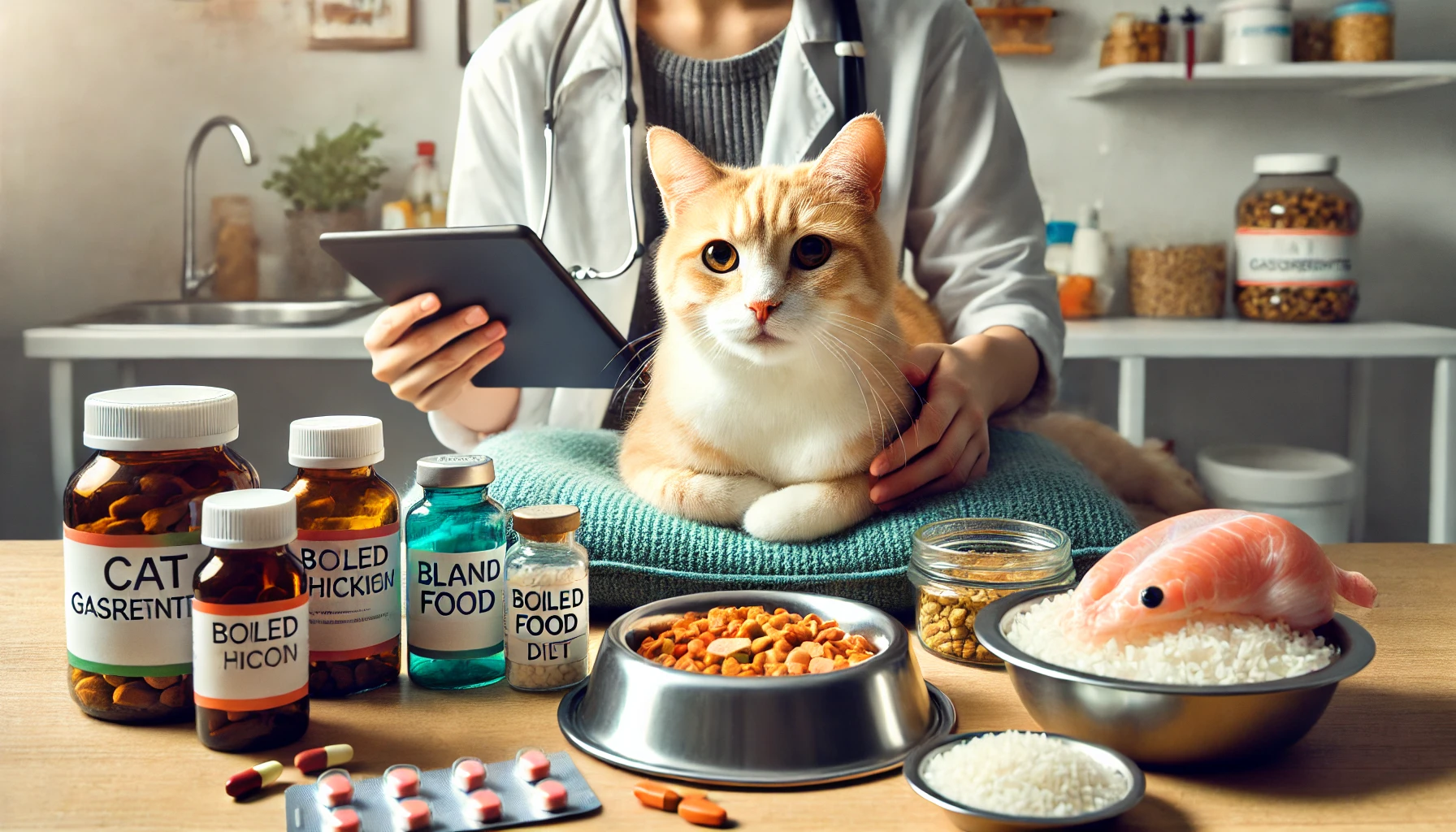
Cat Gastroenteritis: Treatment Options – Medication and Diet
The treatment of cat gastroenteritis will depend on the cause, the severity of symptoms, and how promptly your cat has been taken to a veterinarian.
Early treatment can prevent more serious complications such as dehydration or secondary infections.
Now, let’s discuss the different available treatment options for managing the condition in cats, with a focus on medication, dietary changes, and supportive care.
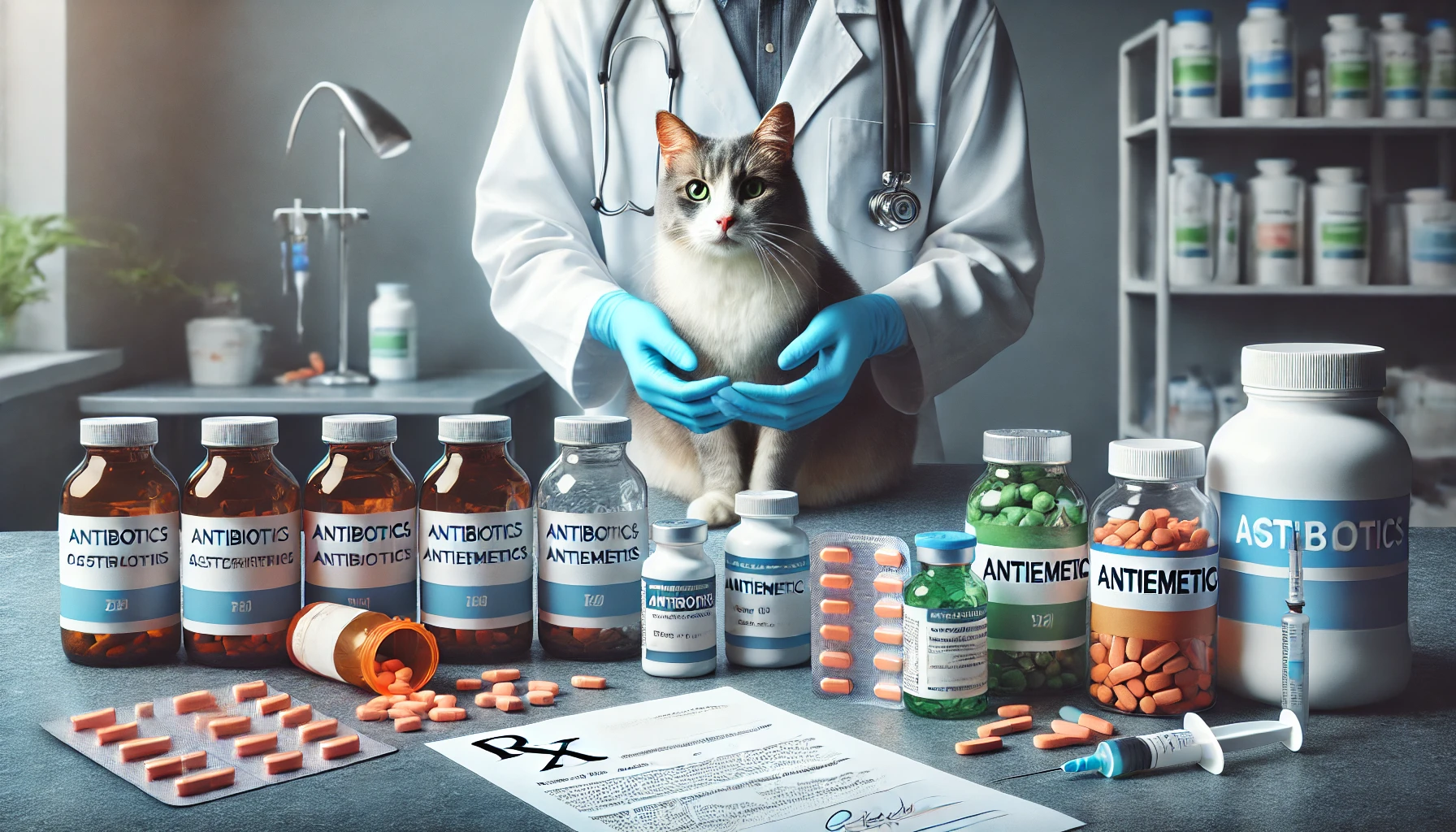
Medications Commonly Prescribed for Gastroenteritis
Once a veterinarian has diagnosed cat gastroenteritis, a host of medications can be prescribed.
The most common include:
- Antibiotics: Gastroenteritis resulting from bacterial infection requires antibiotics such as metronidazole or amoxicillin to combat the infection.
- Antiemetics: Veterinarians commonly prescribe antiemetics like maropitant or ondansetron to block pathways that cause vomiting, preventing dehydration.
- Probiotics: Administering probiotics can help restore the normal gut flora, especially when gastroenteritis is caused by an imbalance in the digestive tract’s bacterial population.
- Anti-inflammatory medications: Vets may prescribe anti-inflammatory medication to reduce severe inflammation and swelling of the gastrointestinal lining.
- Fluid therapy: Fluid therapy is administered either intravenously (IV) or subcutaneously to maintain hydration when dehydration is a concern.
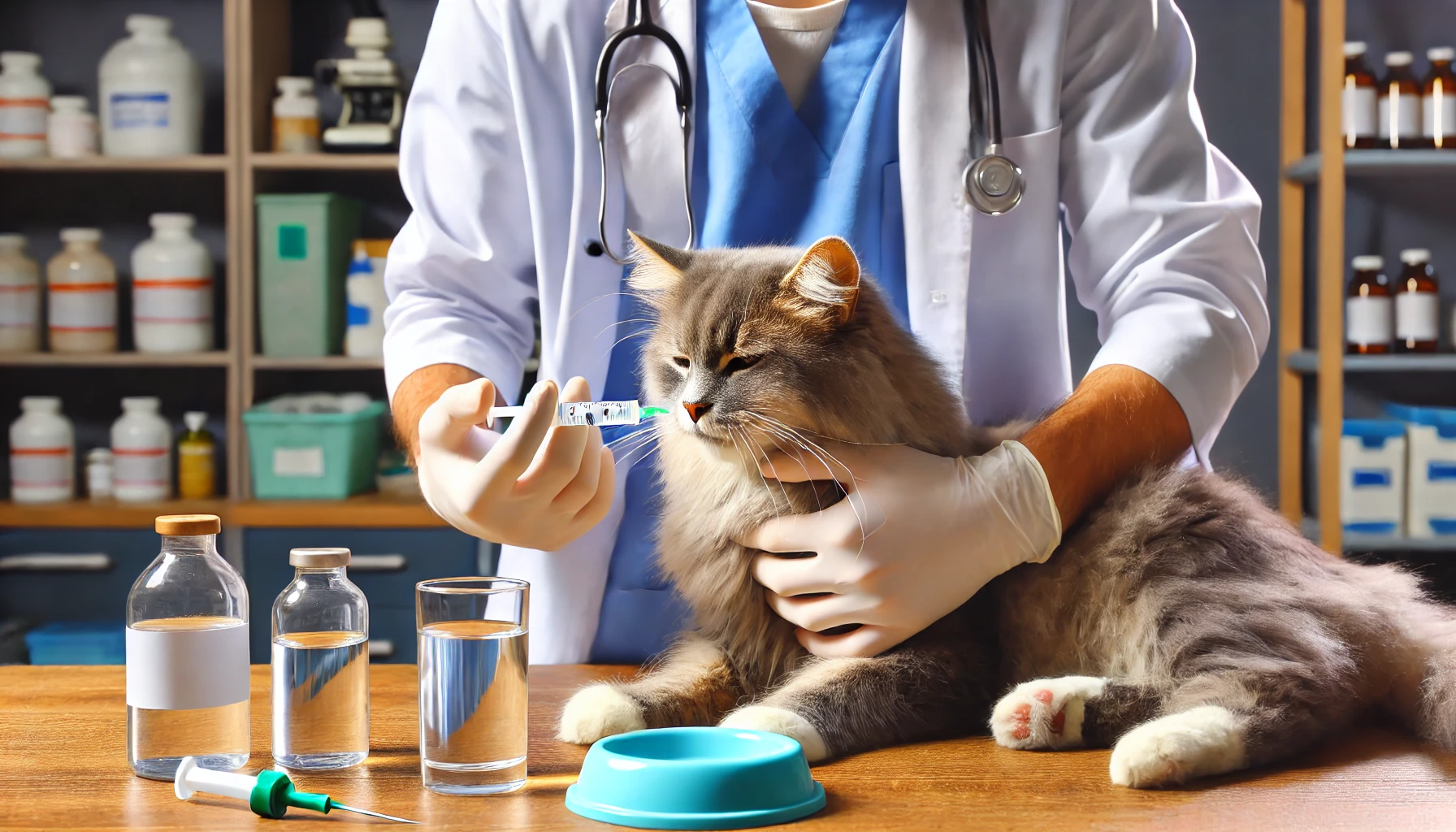
The Role of Hydration in Recovery
One of the most important approaches to managing feline gastroenteritis is ensuring proper hydration.
Due to significant fluid loss through vomiting and diarrhea, keeping your cat hydrated is essential.
In mild cases, your vet may recommend increasing your cat’s water intake at home.
In more severe cases, fluid therapy will be required to replenish lost fluids, electrolytes, and nutrients, preventing dehydration, which can be life-threatening if left untreated.
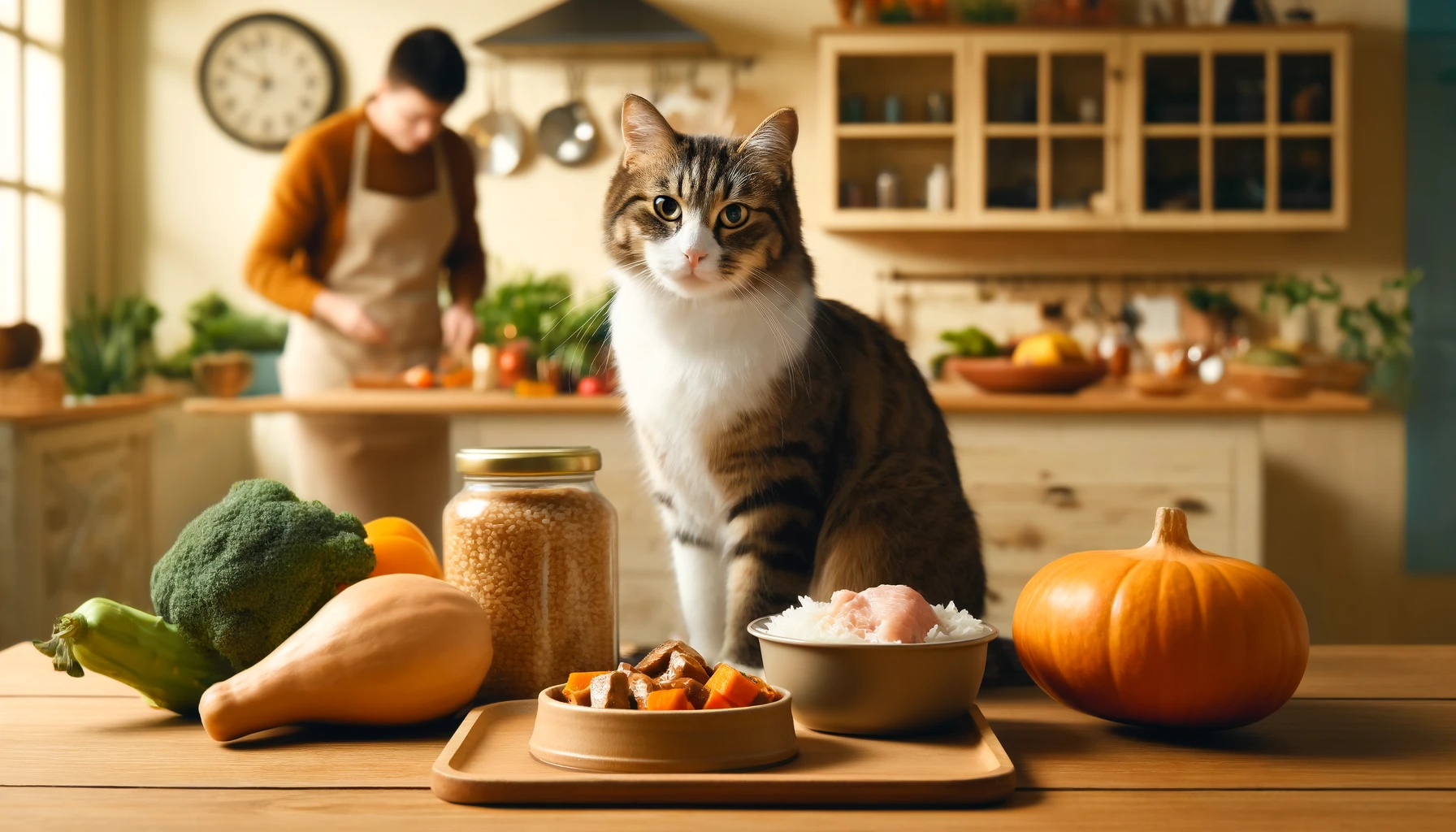
Dietary Changes to Support Healing from Gastroenteritis
Dietary changes are another crucial factor in helping your cat recover from gastroenteritis.
Your vet may recommend withholding food for 12-24 hours to allow the digestive system to rest.
Afterward, you can gradually introduce a bland, easily digestible diet.
Common options include:
- Boiled chicken or turkey: Plain, skinless chicken or turkey is gentle on your cat’s stomach and provides much-needed protein.
- White rice or pumpkin: These help firm up your cat’s stool and provide gentle fiber for digestion.
- Prescription diets: Your vet may prescribe a specialized gastrointestinal diet designed to support healing and reduce further irritation of the digestive system.
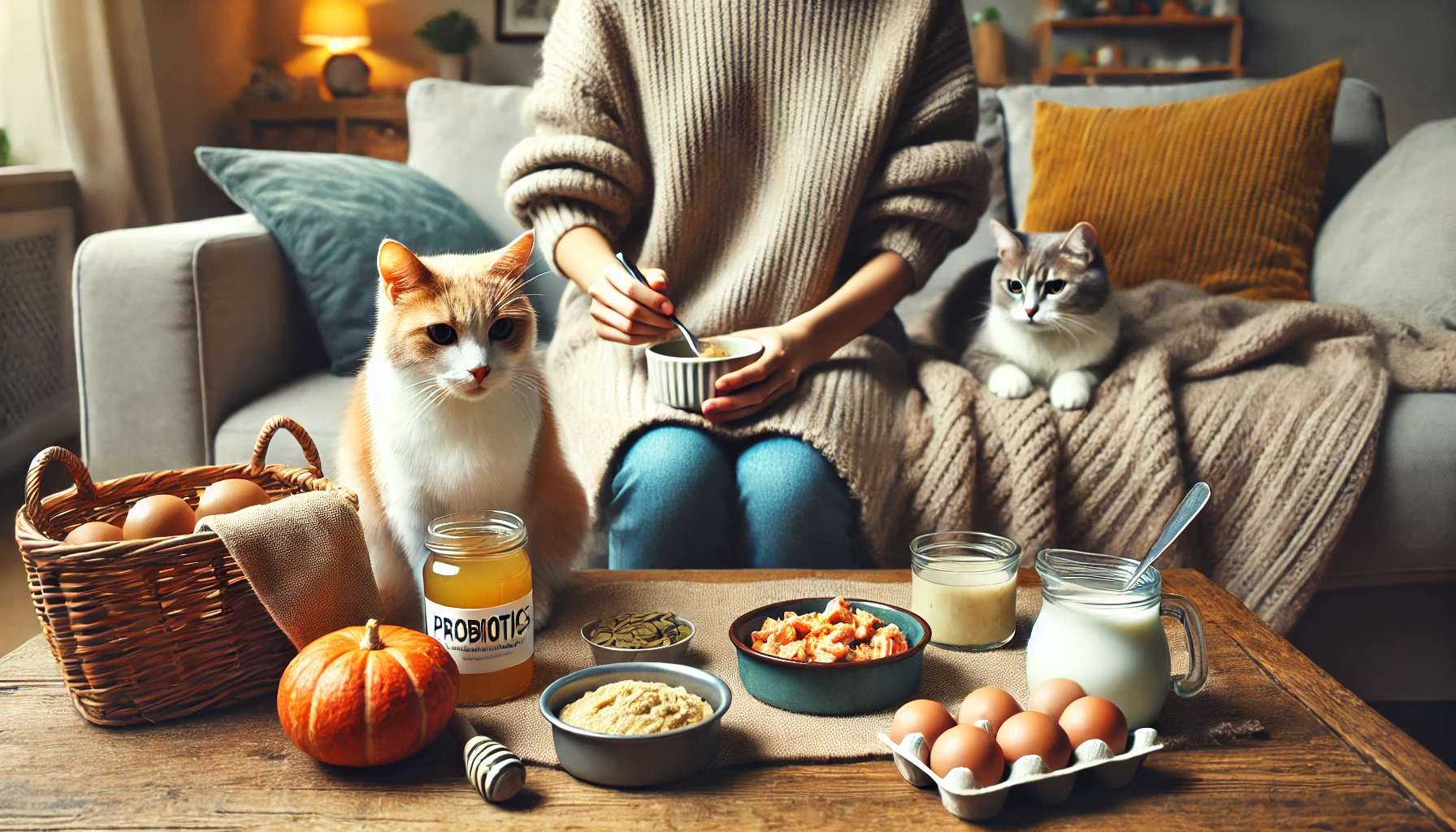
Home Remedies and When to Use Them
Mild cat gastroenteritis may resolve with simple remedies, but home remedies should not be attempted without a veterinarian’s guidance.
Potential options include:
- Providing fresh water at all times to prevent dehydration.
- Offering small, frequent meals of bland food to aid digestion.
- Administering probiotics, as recommended by your vet, to restore healthy gut flora.
However, if your cat’s symptoms do not improve or worsen, a professional veterinarian should be consulted.
Gastroenteritis can become severe, and only a vet can determine the right course of action for your cat.

The Importance of Following Veterinary Advice
While home remedies and dietary changes may provide relief, full recovery from cat gastroenteritis requires following your veterinarian’s advice.
Poor management can lead to complications such as chronic inflammation or long-term digestive issues.
Always complete any prescribed antibiotics, adhere to dietary recommendations, and closely monitor your cat’s symptoms.
If your cat shows signs of relapse, return to the vet for further evaluation.
Effective treatment includes medication, fluid therapy, and dietary changes. Early treatment can prevent complications, ensuring a swift recovery for your cat.
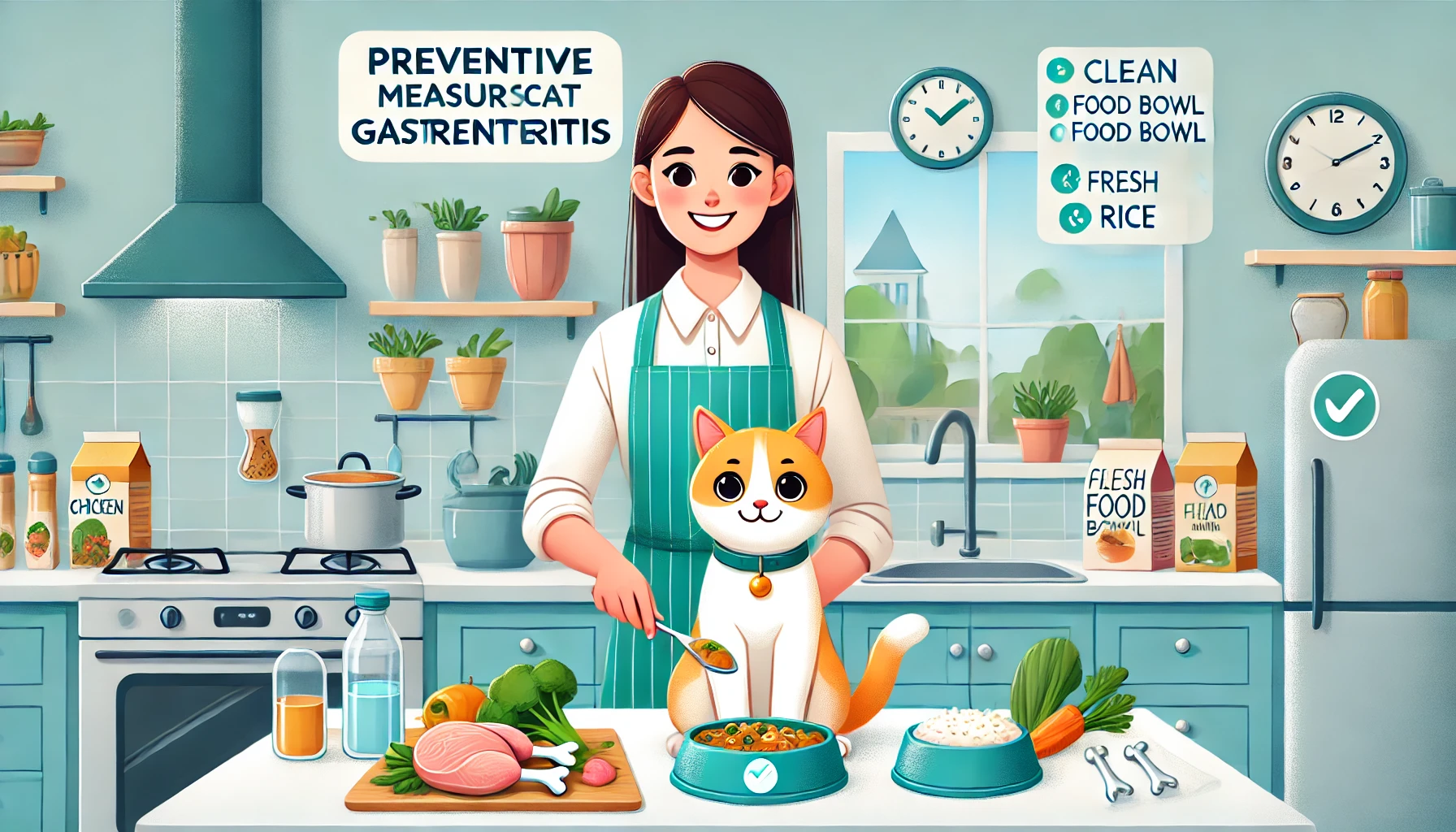
Preventing Cat Gastroenteritis: Tips and Best Practices
Even though cat gastroenteritis can usually be treated effectively, it is always easier to prevent an illness than it is to cure one.
You can take proactive steps to avoid common triggers so your cat will not have to endure this uncomfortable disorder.
Now, let’s explore some of the most effective ways to prevent cat gastroenteritis, including tips on diet, hygiene, and routine care.
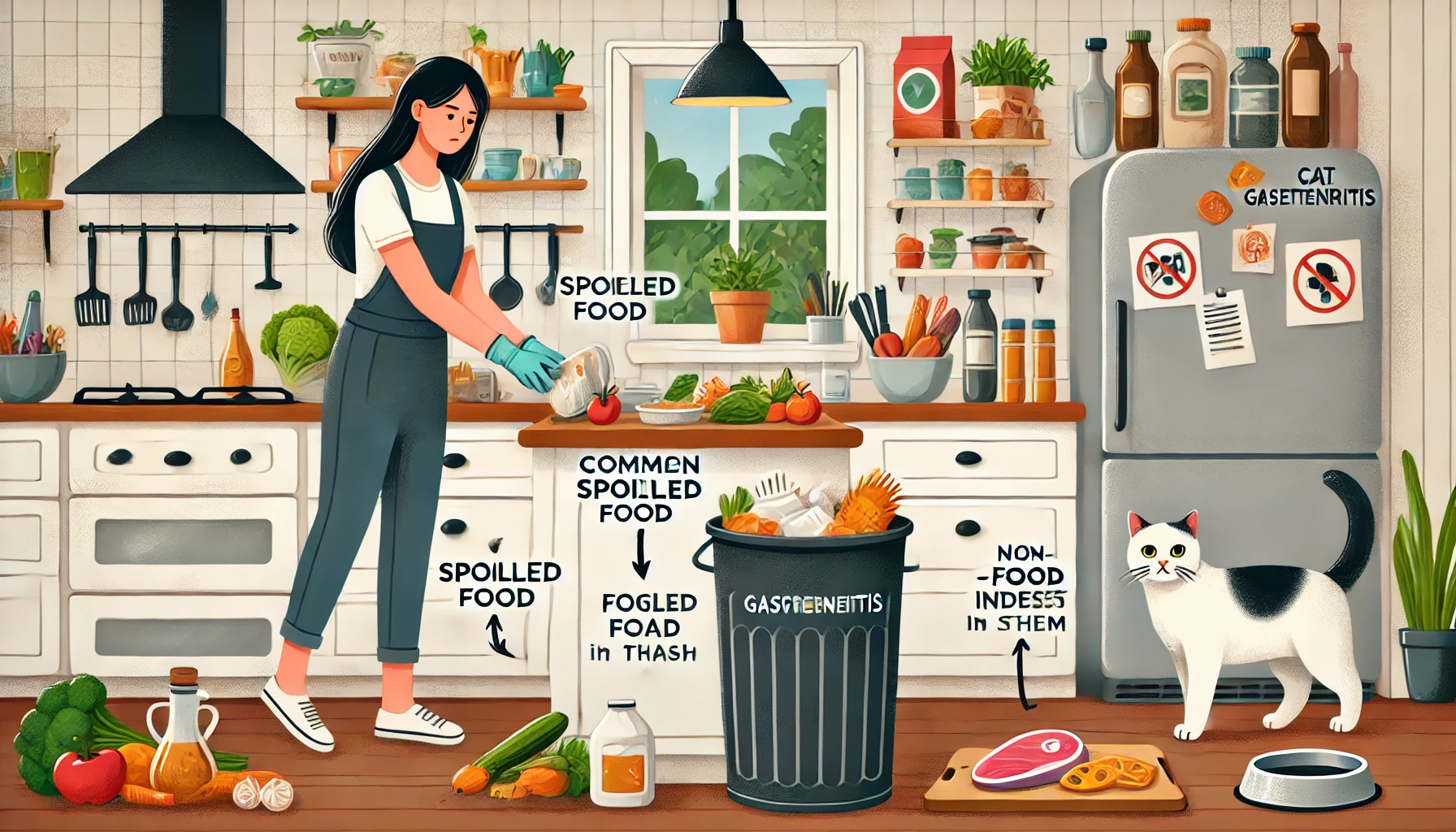
Common Triggers for Gastroenteritis and How to Avoid Them
Knowing the various possible triggers that may cause cat gastroenteritis is important in preventing the condition.
Some of the common triggers include:
- Dietary indiscretion: Spoiled food, garbage, and non-food items make cats highly prone to gastroenteritis. Ensure that the food given to your cat is fresh and well-preserved, and avoid giving them table scraps or foods that upset their stomach.
- Sudden diet changes: Sudden changes in your cat’s food can irritate their stomach. Food transitions should always be done gradually, mixing small amounts of the new food into the old food over several days.
- Food allergies or sensitivities: Some cats may have allergic reactions or sensitivities to certain ingredients, such as grains or proteins like beef or chicken. If your cat experiences persistent gastrointestinal upset, visit a veterinarian to assess for potential allergies.
- Exposure to toxins: Cats can easily ingest toxic chemicals, such as cleaning solutions, plants, or human medications. Keep these substances safely out of your cat’s reach.
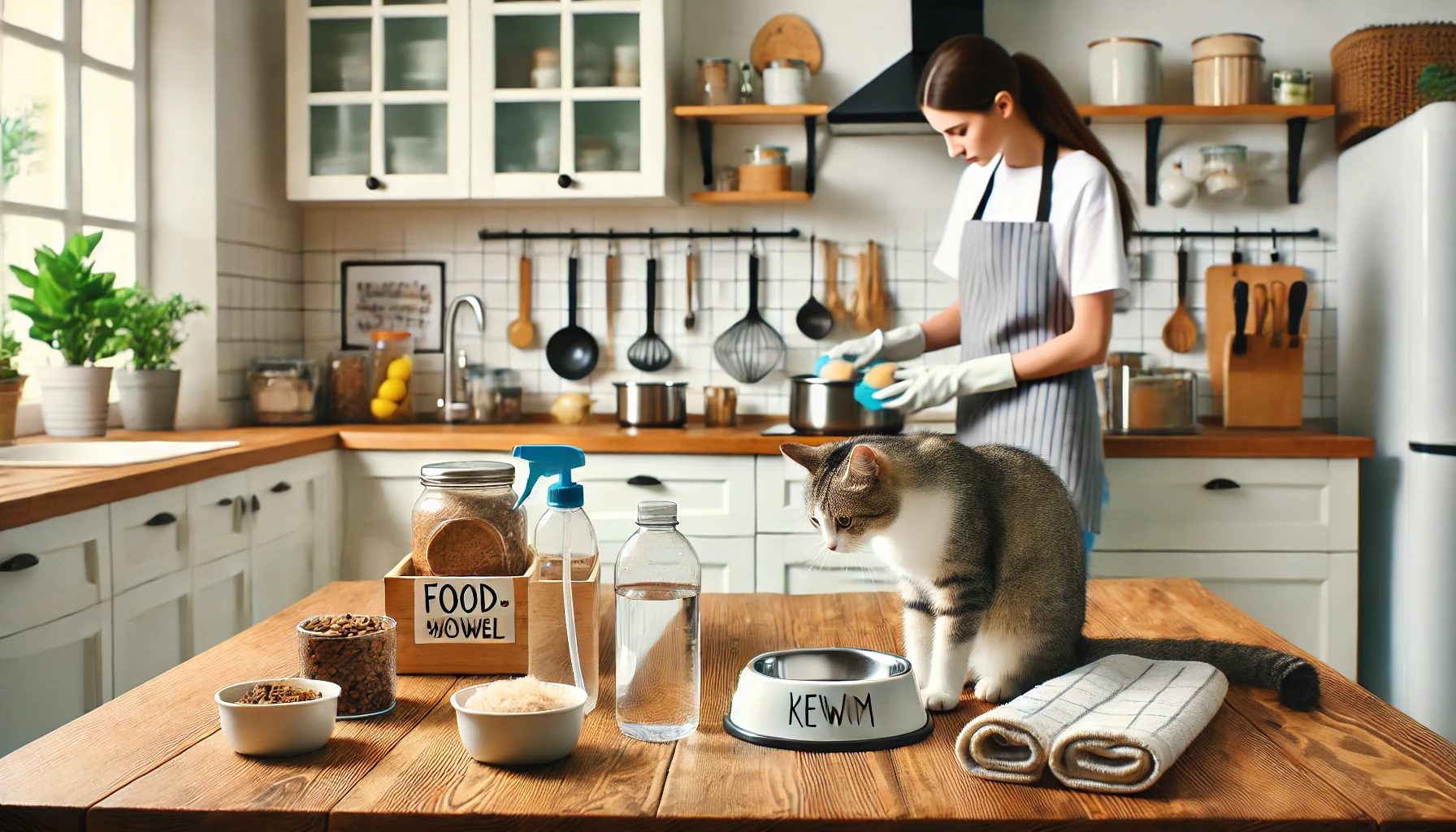
The Importance of Proper Hygiene and Sanitation
Hygiene is crucial in avoiding infections that can lead to cat gastroenteritis.
Proper hygiene reduces exposure to bacteria, viruses, and parasites.
Key practices include:
- Regularly cleaning food and water bowls to prevent the buildup of bacteria.
- Keeping litter boxes clean to avoid bacterial contamination, especially in multi-cat households.
- Washing your hands thoroughly after handling food, litter, or cleaning products.
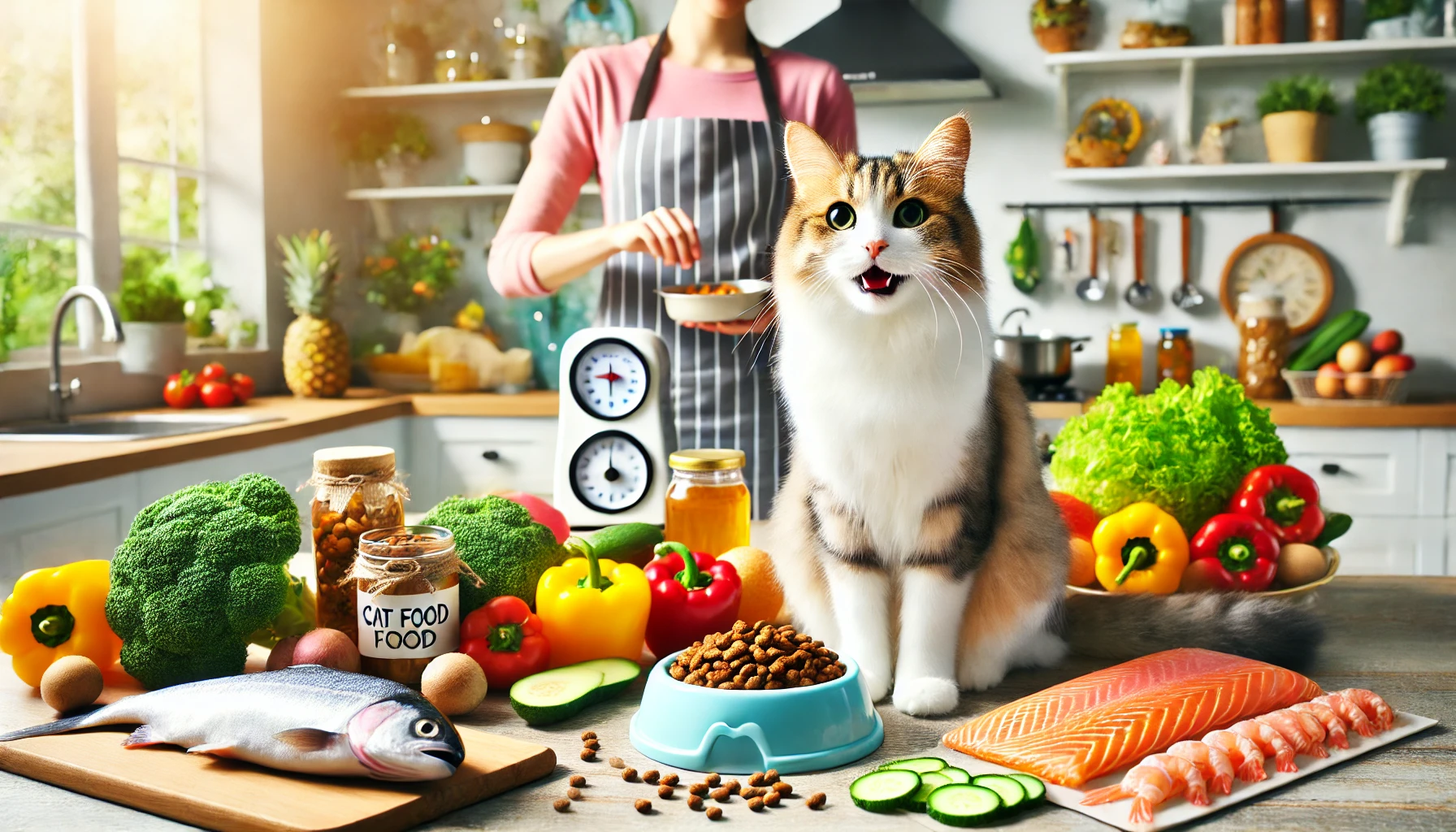
Dietary Tips to Keep Your Cat’s Digestive System Healthy
Your cat’s diet plays a major role in maintaining overall health and preventing gastroenteritis.
Here are the best ways to keep your cat’s digestive system healthy:
- Feed your cat a well-balanced, high-quality diet that meets their nutritional needs.
- Avoid table scraps and rich, fatty foods that can upset your cat’s stomach.
- Provide plenty of fresh water to aid digestion and prevent dehydration.
- Consider adding probiotics or digestive supplements (with your vet’s approval) to promote healthy gut flora.
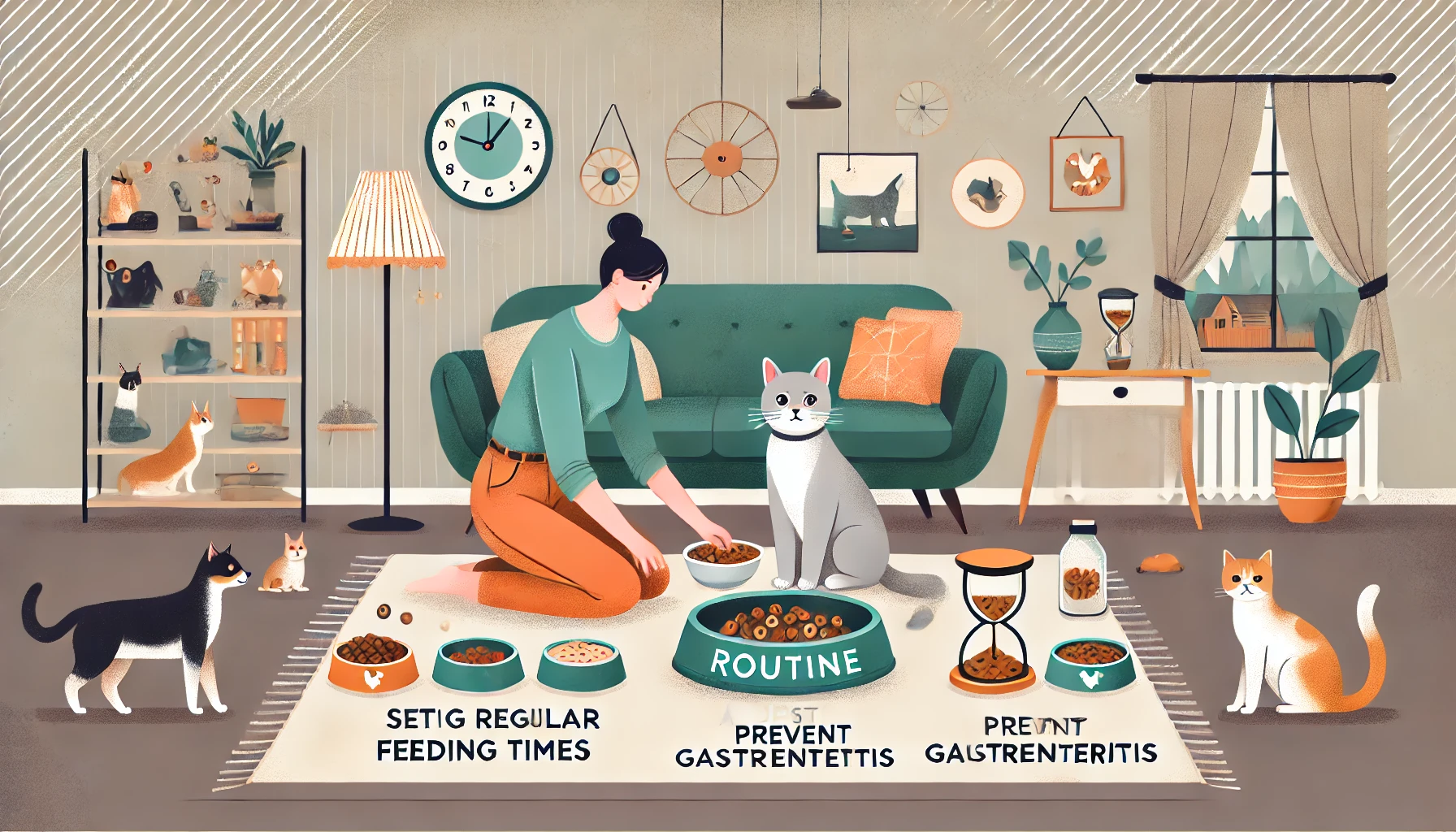
When to Adjust Your Cat’s Routine to Prevent Gastroenteritis
Sometimes, changes to your cat’s routine may be necessary to prevent gastroenteritis, especially if they are prone to digestive issues.
Consider making these adjustments:
- If your cat experiences frequent digestive problems, switching to a sensitive stomach formula, with your vet’s guidance, may help.
- If your cat tends to overeat, implement portion control and set regular feeding times to prevent overeating and digestive stress.
- If your cat is stressed due to relocation, changes in the household, or other factors, create a calm environment and offer stress-relief aids to prevent stress-induced gastroenteritis.
By identifying some of these triggers and implementing these preventive measures, you can significantly reduce the chances of your cat developing gastroenteritis and help them stay healthy and comfortable.
Prevention involves proper diet, hygiene, and stress management. Avoid sudden food changes and keep your cat’s environment clean to reduce the risk of gastroenteritis.
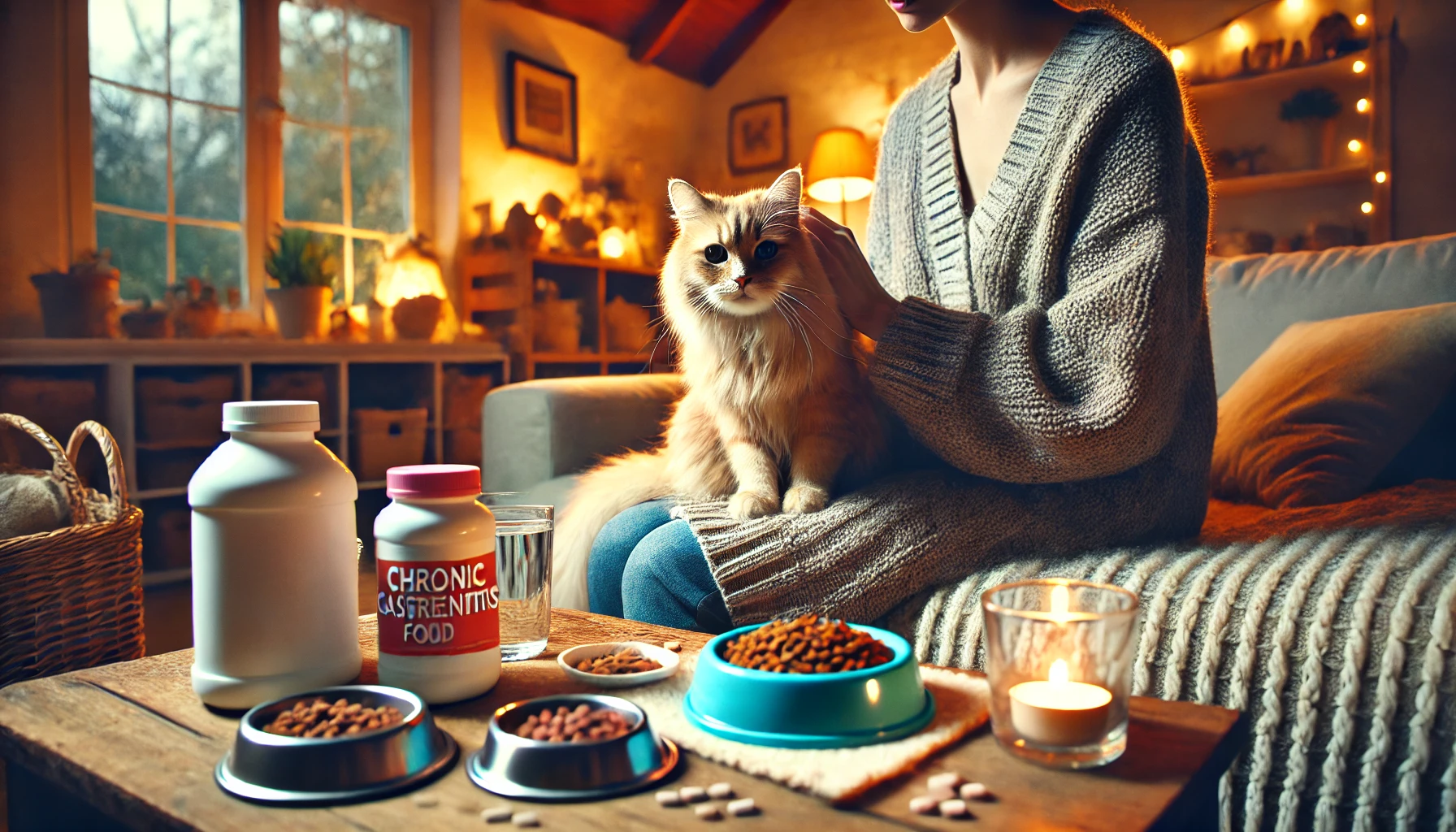
Managing Chronic Gastroenteritis in Cats: Long-Term Care
Chronic gastroenteritis is a challenging condition to cure in cats, as it is characterized by chronic or recurring inflammation of the gastrointestinal tract.
Cats with chronic gastrointestinal disorders require long-term care to minimize symptoms and improve their quality of life.
Let’s discuss the management of chronic gastroenteritis, including tips on special diets, monitoring symptoms, and when specialized veterinary care is necessary.
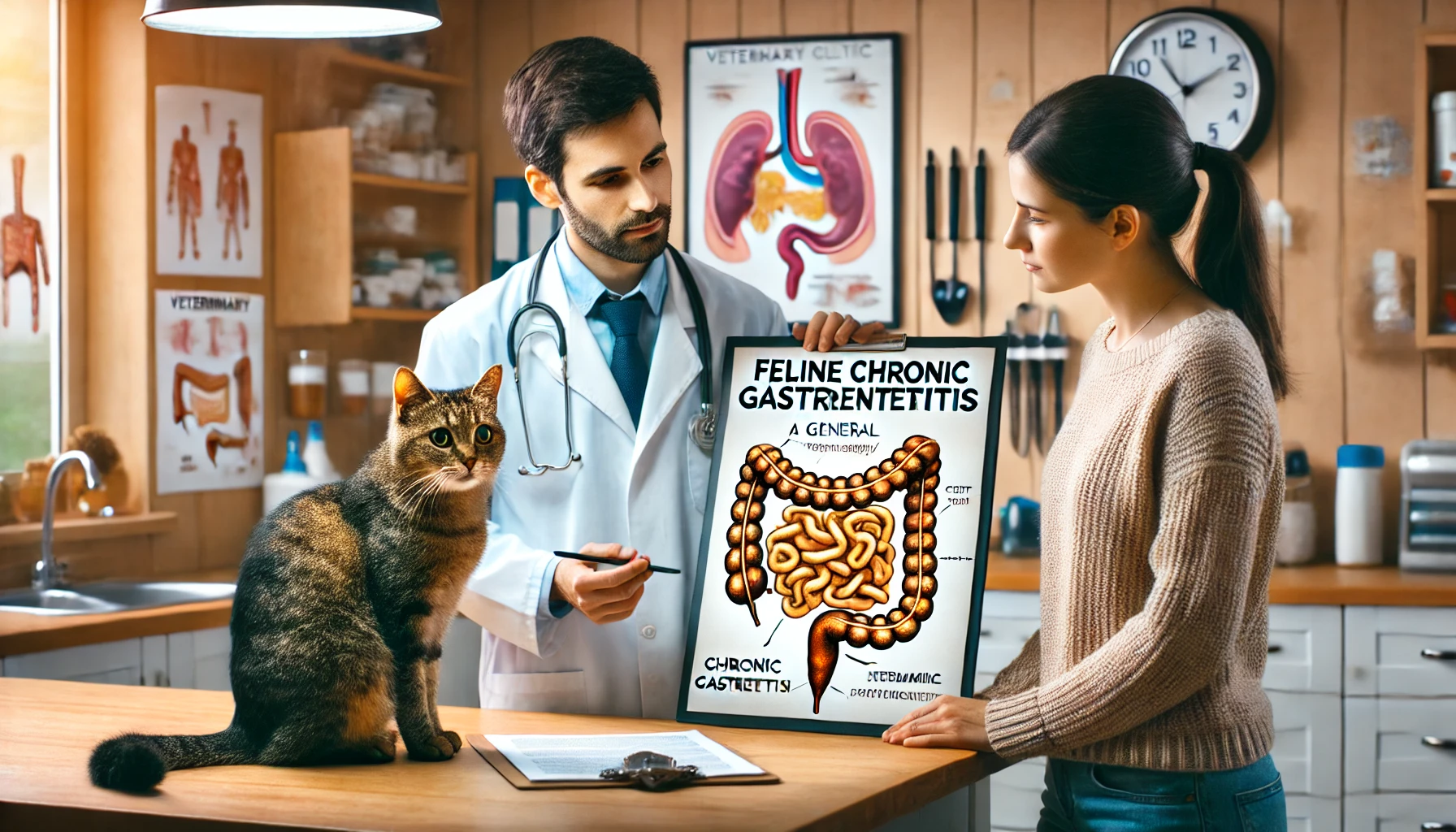
Feline Chronic Gastroenteritis: A General Perspective
Chronic gastroenteritis represents inflammation of the stomach and intestines that is continuous or recurrent.
While acute gastroenteritis usually lasts a few days, the chronic form may extend over weeks, months, or longer.
Common causes include food sensitivities, inflammatory bowel disease (IBD), infections, or even stress.
Identifying the root cause is essential for effective management, which often involves dietary adjustments in combination with medical treatment.
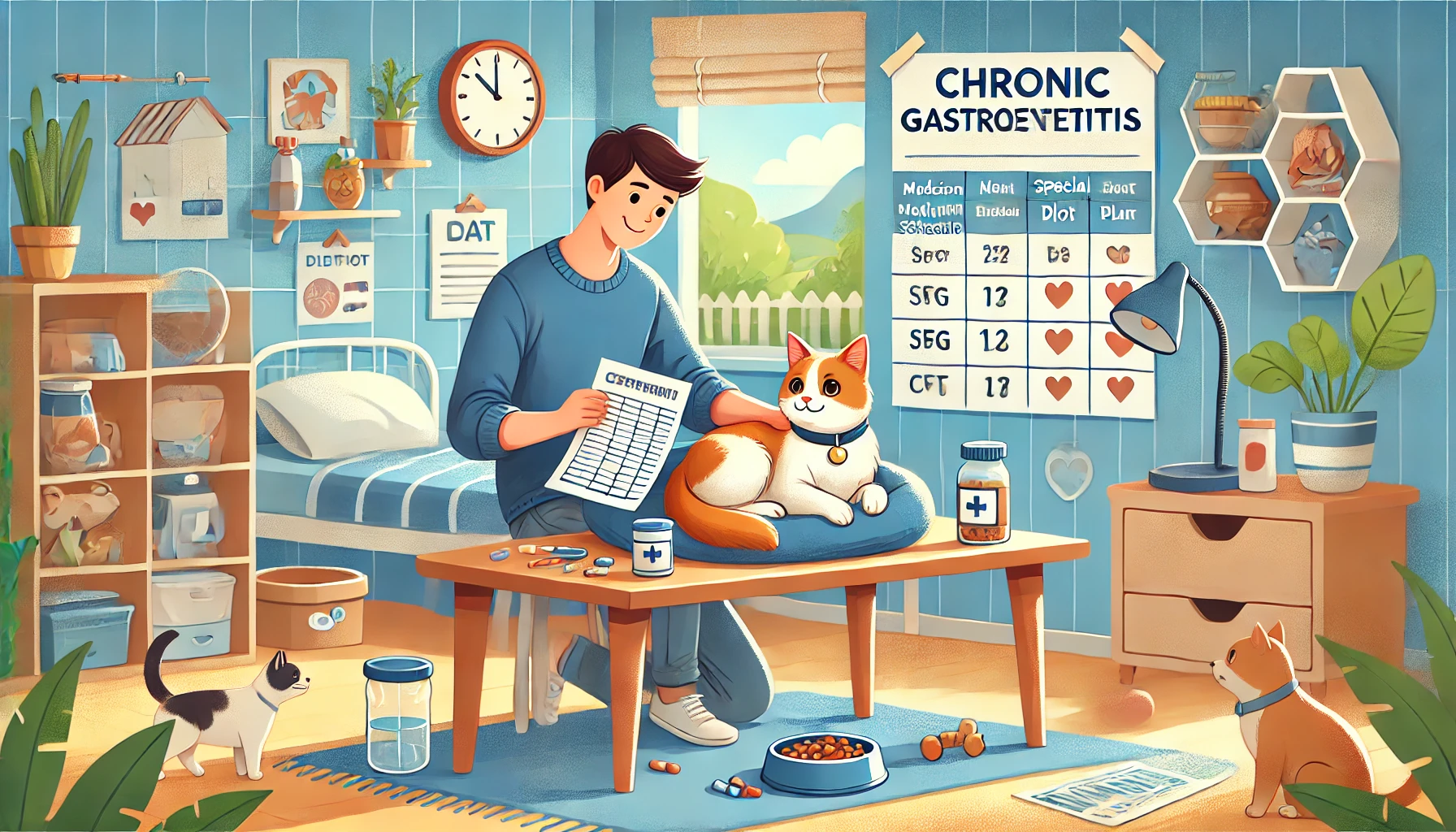
Living with Symptoms: The Long-Term Care Plan
The ideal management of chronic gastroenteritis involves developing a long-term care plan tailored to your cat’s needs.
This may include:
- Regular veterinary visits: Regular checkups monitor your cat’s condition, track progress, and make necessary adjustments to their treatment plan.
- Medications: In some cases, your cat may need medications like anti-inflammatories, probiotics, or immunosuppressants to manage symptoms.
- Hydration support: Ensuring your cat stays hydrated is crucial, especially if they frequently vomit or experience diarrhea. Your vet may suggest fluid therapy in more severe cases.
- Stress reduction: Minimizing stress is important, as stress can exacerbate symptoms. A calm and quiet environment can help reduce flare-ups in cats.

Special Diets for Cats with Chronic Gastroenteritis
Diet plays a crucial role in managing chronic gastroenteritis.
Your veterinarian may prescribe a special diet to minimize inflammation and support gastrointestinal health.
Common dietary strategies include:
- Hydrolyzed protein diets: These diets break down proteins into smaller particles, making them easier for your cat to digest and less likely to trigger an immune response.
- Limited ingredient diets: A diet with fewer ingredients can help identify and eliminate potential food allergens or intolerances that may be causing chronic gastroenteritis.
- Prescription gastrointestinal diets: These are specially formulated to support cats with gastrointestinal disorders and reduce irritation in the gut.
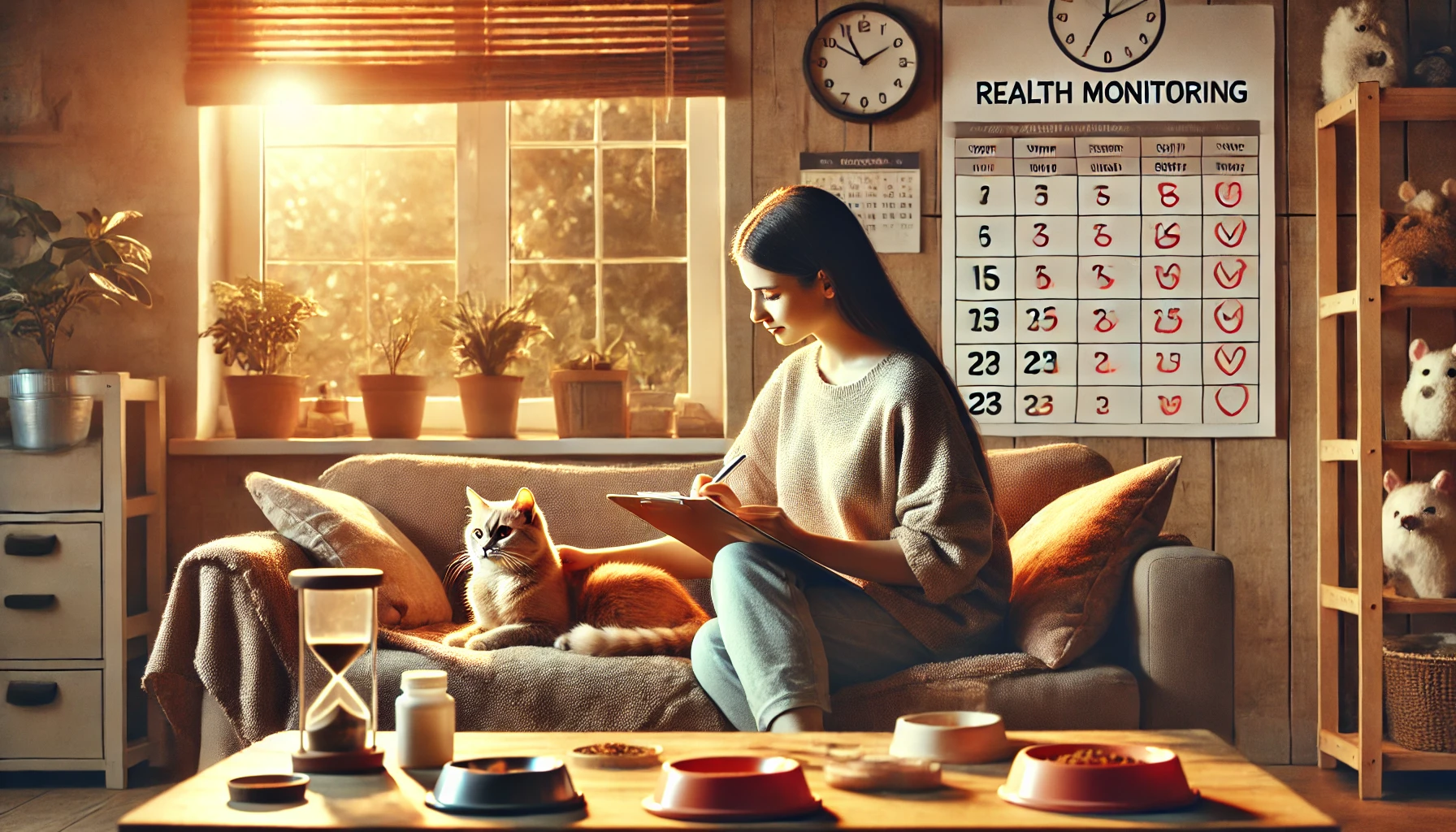
Monitoring Your Cat’s Condition Over Time
Managing chronic gastroenteritis requires consistent monitoring of your cat’s symptoms and overall health.
Keep track of changes in appetite, weight, stool consistency, and energy levels, as sudden changes in these areas may signal flare-ups or the need to adjust their treatment plan.
- Track stool quality: Use a stool chart to monitor consistency and color, as these can provide valuable insights into how well your cat is coping with their condition.
- Monitor appetite and weight: Inform your vet if there are sudden changes in appetite or unexplained weight loss, as these may indicate worsening symptoms.
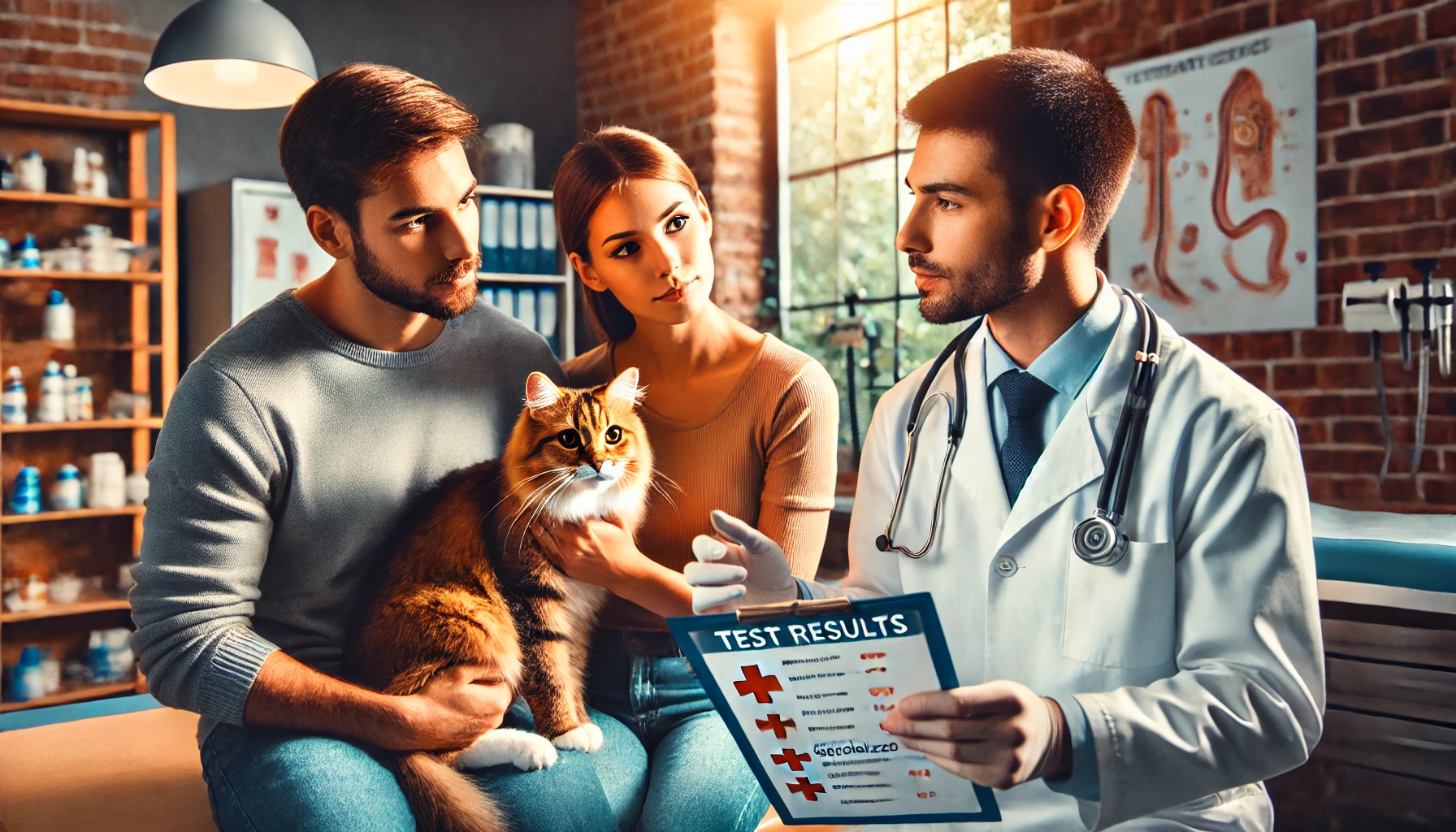
When to Consider Specialized Veterinary Care
If your cat’s chronic gastroenteritis does not improve with standard treatment or they experience frequent relapses, it may be time to seek specialized veterinary care.
A veterinary gastroenterologist can perform advanced diagnostic tests, such as endoscopy or biopsies, to better understand the underlying cause of your cat’s problems.
They may also recommend immunosuppressive therapy or more aggressive dietary changes.
By taking proactive steps to manage chronic gastroenteritis, you can improve your cat’s quality of life and reduce the frequency and severity of their symptoms.
A successful long-term care plan requires regular veterinary care, special diets, and close monitoring.
Chronic gastroenteritis requires regular vet check-ups, special diets, and stress management. Long-term care helps control symptoms and improve your cat’s quality of life.
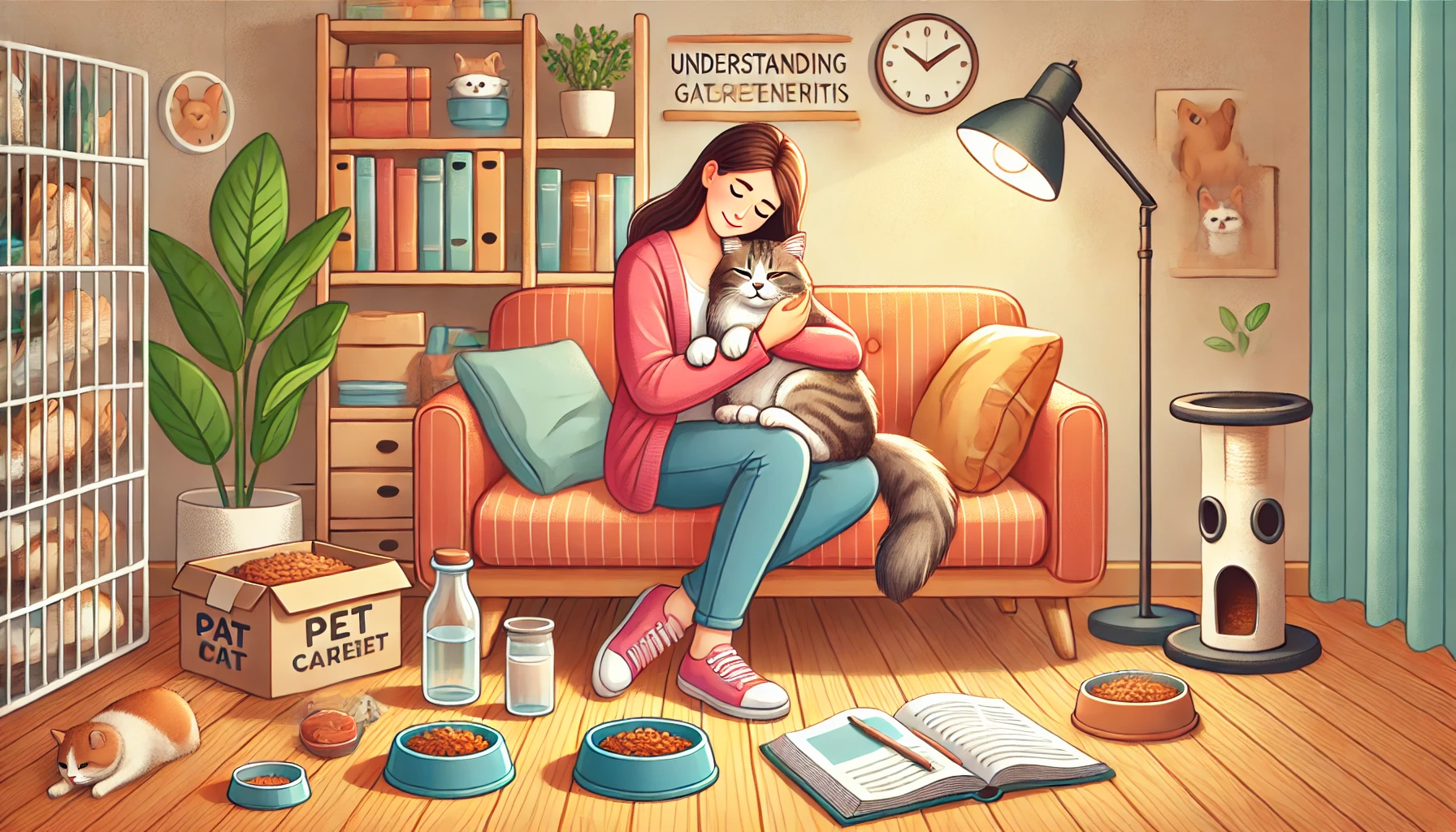
Conclusion: Understanding and Managing Cat Gastroenteritis
Cat gastroenteritis is a condition that may raise concern for any pet owner, but with the right knowledge and proactive care, you can significantly reduce the risk of its occurrence and effectively manage the symptoms when they arise.
This article has guided you through all aspects of cat gastroenteritis, including identifying the causes and symptoms, acute and chronic management of the condition, and various means of effective treatment and prevention.
Let’s summarize the main points on how to protect and care for your cat regarding gastroenteritis.
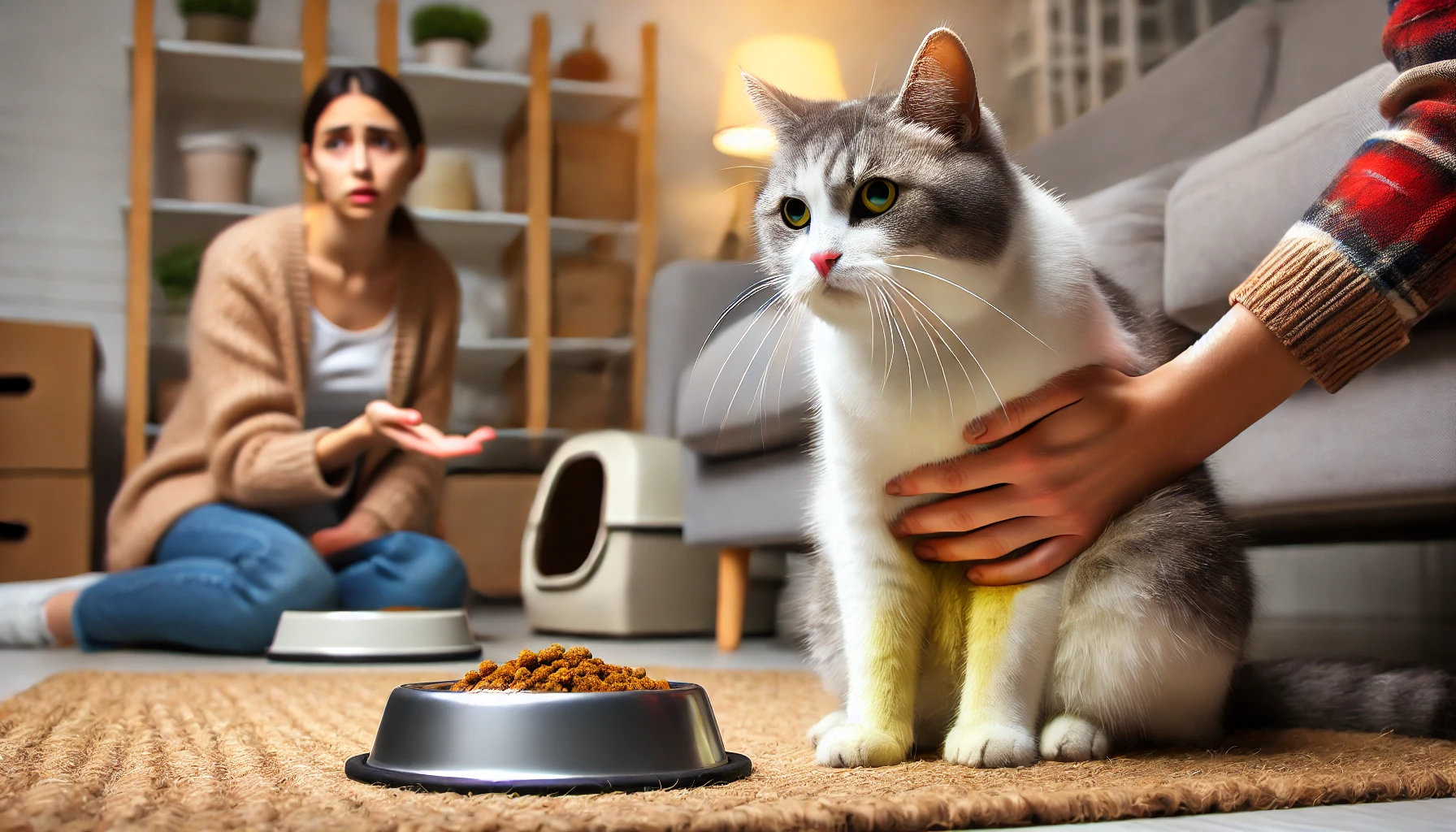
Early Signs of Cat Gastroenteritis
The most effective way of dealing with gastroenteritis in your cat is by recognizing the condition in its earliest stages.
Knowing that symptoms such as vomiting, diarrhea, and lethargy may indicate an underlying illness will prompt timely medical attention.
This early intervention helps avoid complications such as dehydration and serious infections.
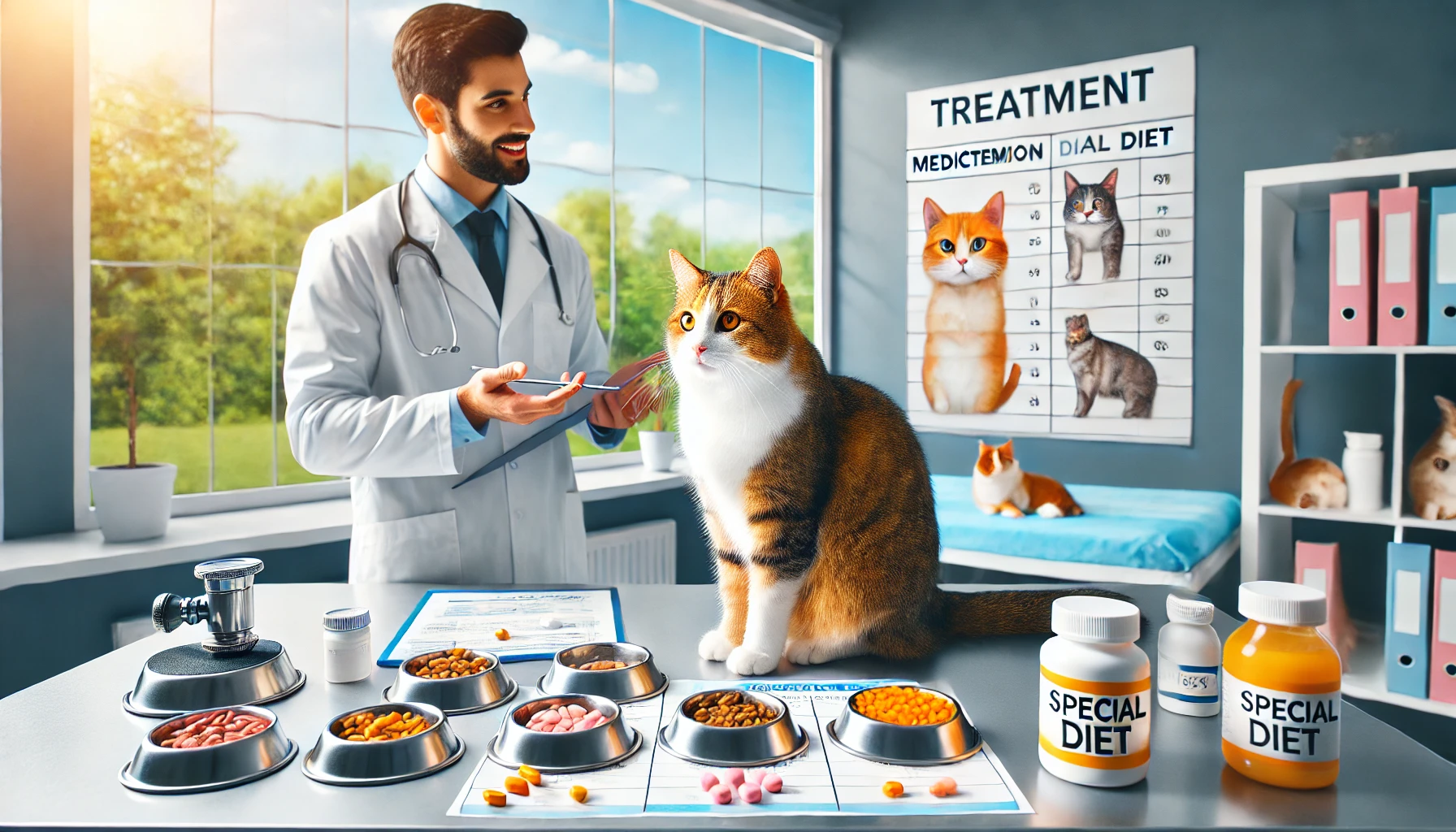
Treatment Options: Medication and Diet
The most common treatments for cat gastroenteritis include medications and dietary changes.
Depending on the underlying cause, your veterinarian may prescribe antibiotics, antiemetics, or probiotics.
In addition to medication, hydration is critical to recovery, as cats can quickly become dehydrated due to vomiting and diarrhea.
Dietary changes, such as bland or prescription diets, help heal and soothe the digestive system.
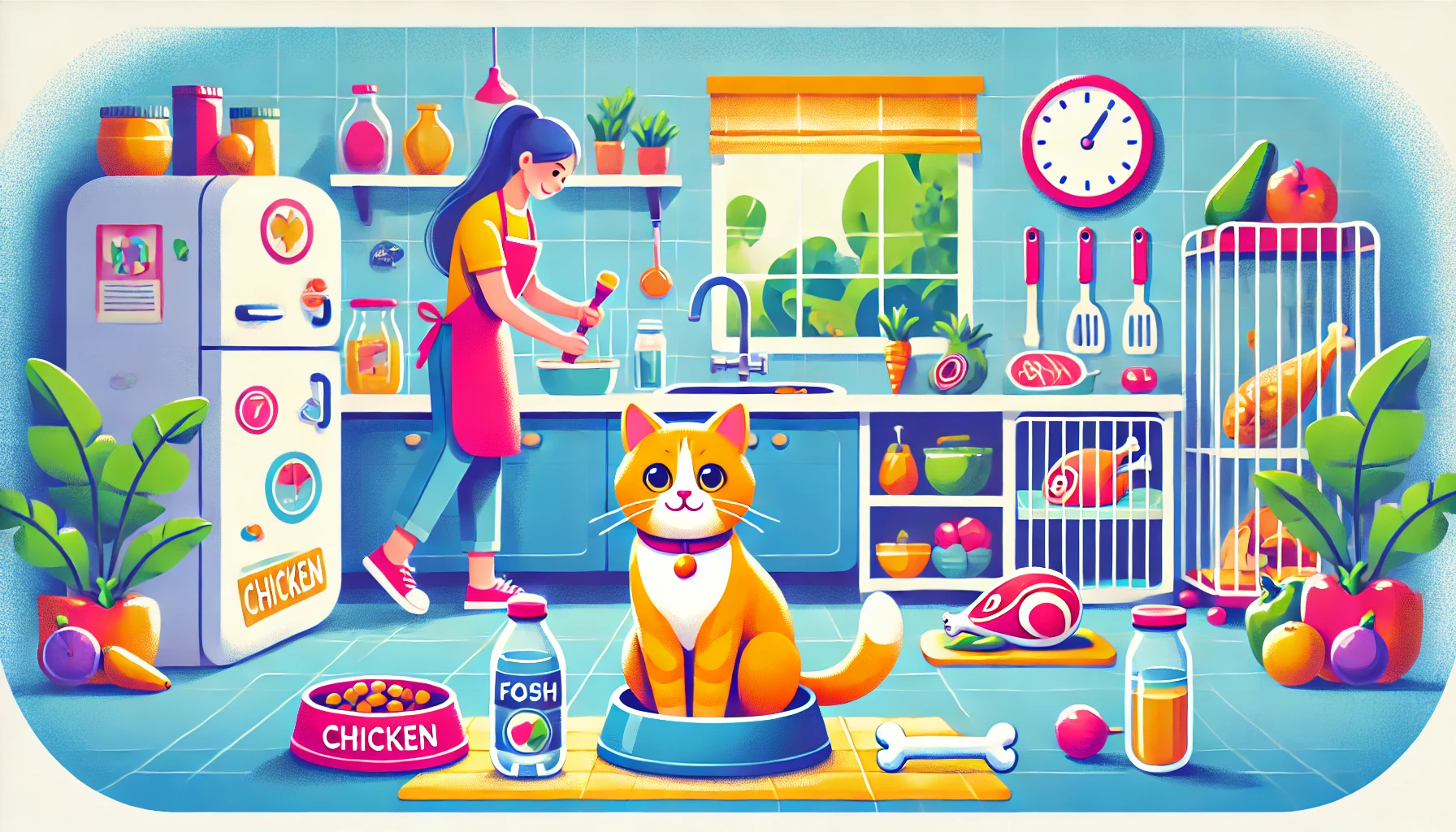
Prevention of Gastroenteritis in Cats
Preventing cat gastroenteritis involves awareness of common triggers such as dietary indiscretion, sudden food changes, and exposure to toxins.
Maintaining proper hygiene, ensuring a clean environment, and providing a balanced diet are essential preventive measures.
Gradual dietary changes and avoiding table scraps are additional steps you can take to keep your cat’s digestive system healthy.
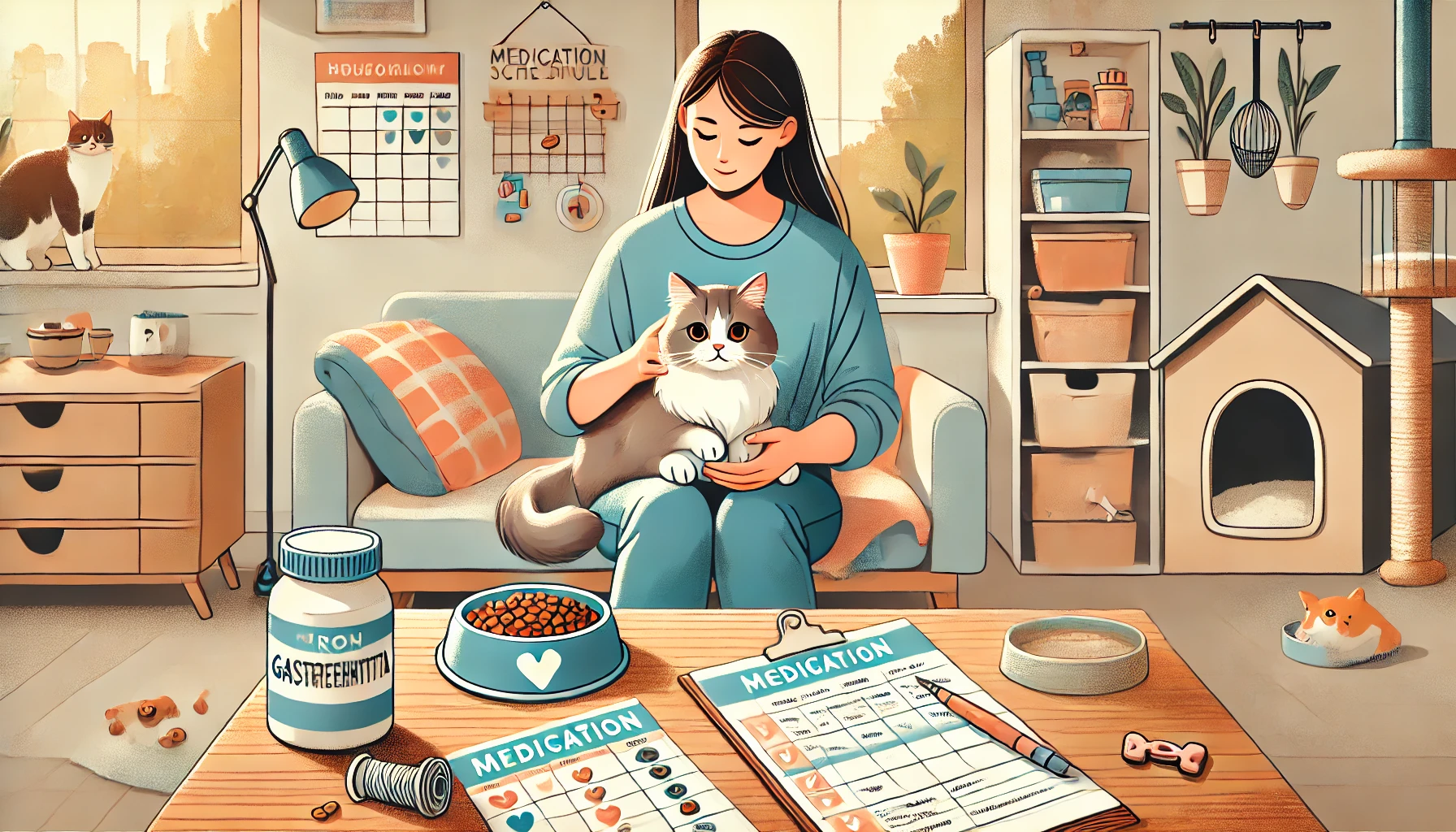
Long-Term Care for Chronic Gastroenteritis
For cats with chronic gastroenteritis, long-term care is necessary.
This includes regular follow-ups with a veterinarian, anti-inflammatory medications, and specialized diets that minimize gastrointestinal irritation.
Monitoring your cat’s condition—specifically stool quality and appetite—is essential.
Any changes in your cat’s health may require adjustments to their treatment plan.
In more severe cases, a referral to a veterinary specialist may be necessary for further management.
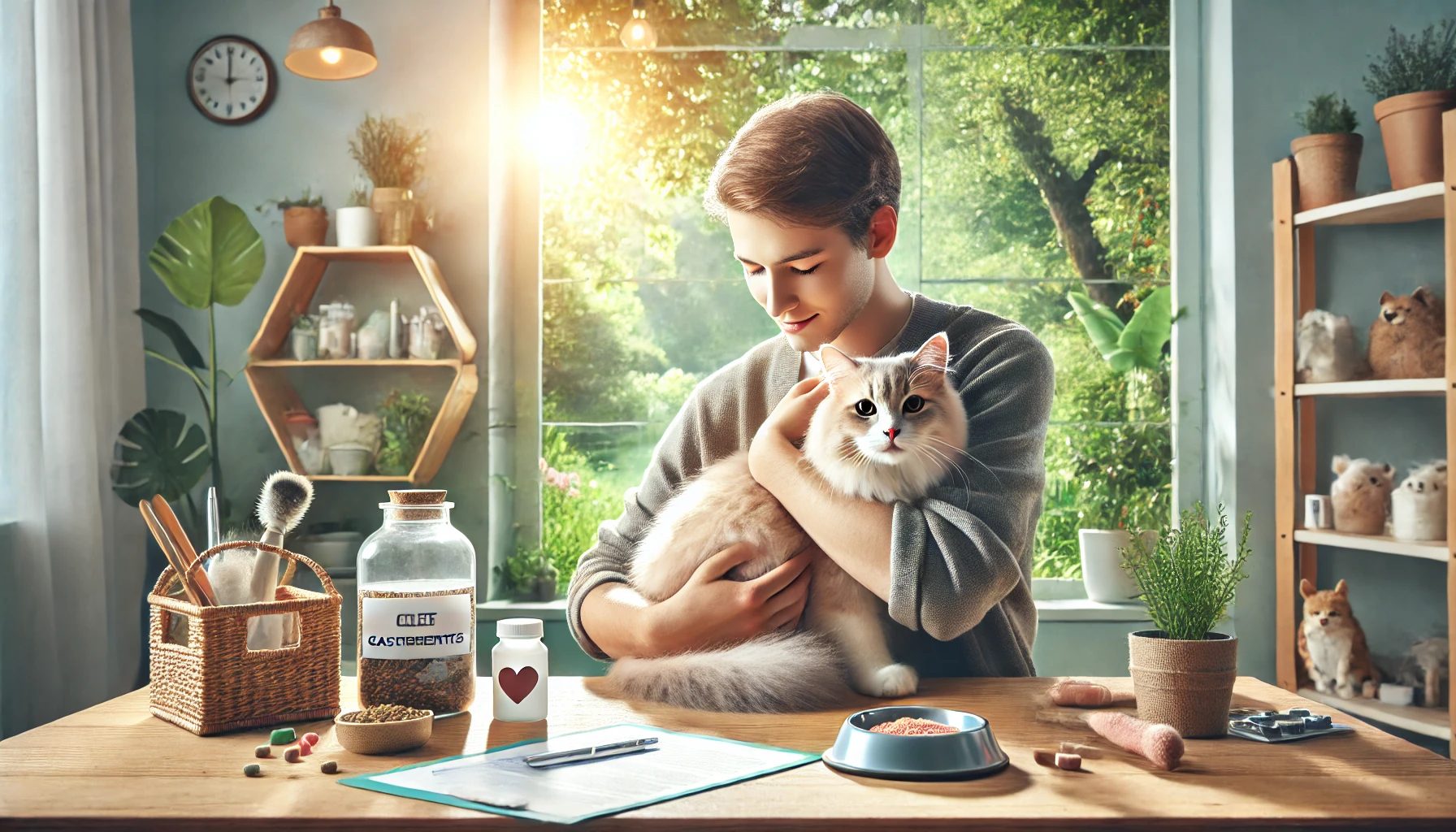
Closing Words
Feline gastroenteritis can be managed through vigilance, timely interventions, and proactive prevention.
If you recognize the symptoms early, administer the appropriate treatments, and provide preventive care, your cat can recover and maintain a healthy digestive system.
Chronic cases require ongoing care, but with proper management, your cat’s quality of life can be significantly improved.
Always follow your veterinarian’s advice and tailor your care to meet your cat’s specific needs, ensuring their comfort and health.
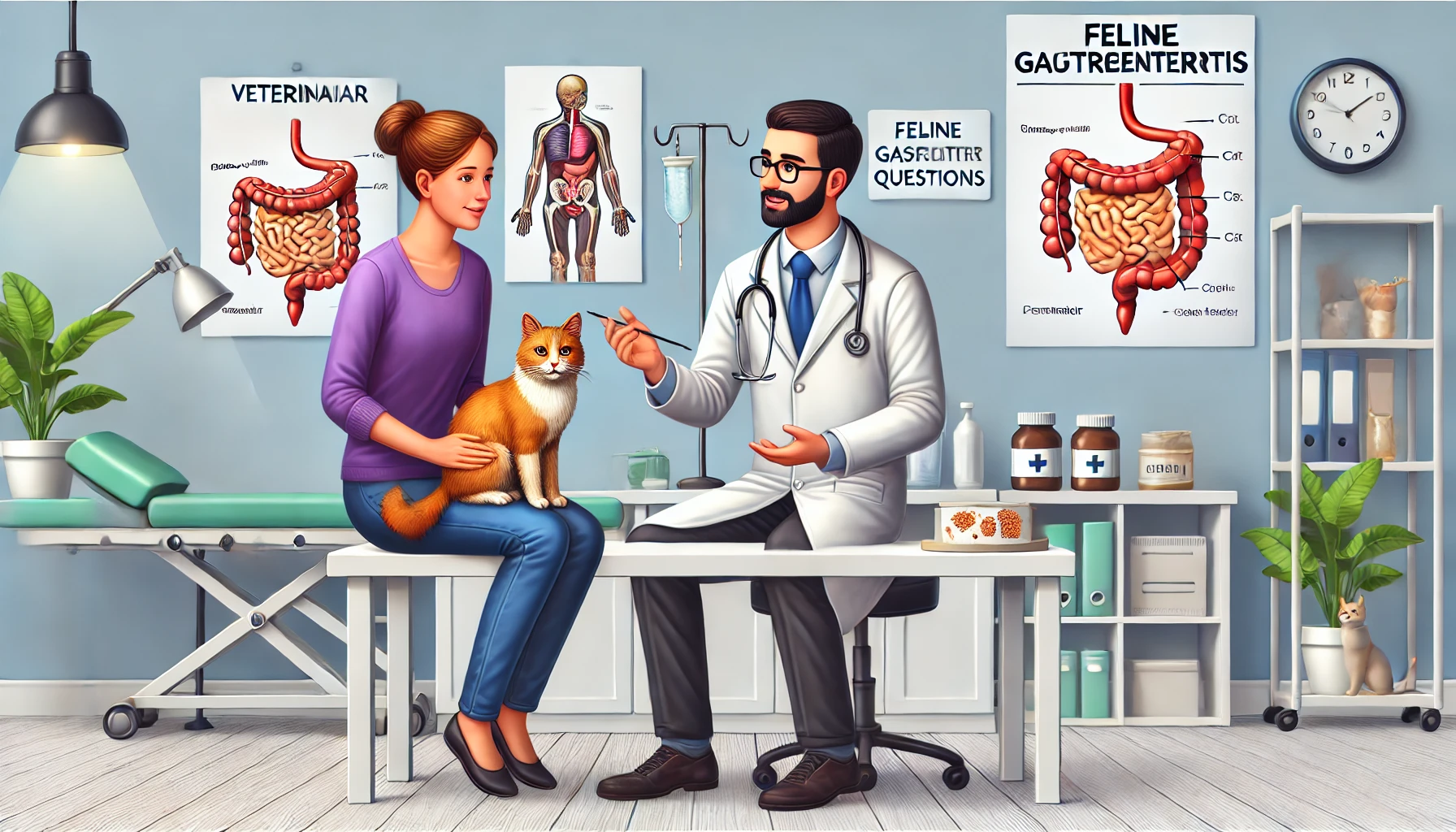
FAQs About Feline Gastroenteritis
Cat gastroenteritis is quite common and a significant concern for any pet owner.
Here are some frequently asked questions to help you understand the condition and how to effectively manage and prevent symptoms in your feline friend.
What is cat gastroenteritis caused by?
Cat gastroenteritis is commonly caused by infections, food sensitivities, toxins, or stress.
Dietary indiscretion, such as ingesting spoiled or inappropriate food, can also trigger inflammation in the feline digestive system.
How would I know if my cat has gastroenteritis?
Symptoms of feline gastroenteritis include vomiting, diarrhea, lethargy, and abdominal discomfort.
Seek veterinary attention if these symptoms persist for more than 24 hours or worsen to determine the underlying cause.
Can cat gastroenteritis clear up on its own?
Mild cases of gastroenteritis may resolve with rest and proper hydration.
However, if symptoms persist or worsen, veterinary care is necessary to avoid complications like dehydration and to determine whether medical intervention is required.
What should I feed a cat with gastroenteritis?
Cats with gastroenteritis should be fed bland foods like boiled chicken or turkey and plain white rice.
In more severe cases, veterinarians may prescribe specialized diets formulated to manage gastrointestinal conditions.
How long does it take for a cat to recover from gastroenteritis?
Recovery time for cat gastroenteritis varies.
Mild cases may improve in a few days with appropriate treatment, while severe or chronic gastroenteritis may take weeks before noticeable recovery is seen.
Can stress cause gastroenteritis in cats?
Yes, stress can cause gastroenteritis in cats, especially those with sensitive stomachs.
Sudden changes in environment or routine may trigger digestive disturbances, requiring stress management to prevent gastrointestinal inflammation.
Is gastroenteritis contagious between cats?
Gastroenteritis can be contagious if caused by an infectious virus, bacteria, or parasite.
It’s important to isolate infected cats and maintain good hygiene to prevent the spread of the condition to other animals.
When should I consult a veterinarian about gastroenteritis?
If your cat shows signs of gastroenteritis for more than 24 hours, or if they are dehydrated, lethargic, or have blood in their vomit or stool, consult a veterinarian as soon as possible for evaluation and treatment.
How can I prevent my cat from developing gastroenteritis?
To prevent cat gastroenteritis, ensure a balanced diet, avoid sudden food changes, and keep toxins, spoiled food, and non-food items out of reach.
Maintaining a clean environment also helps reduce the risk of infection.

